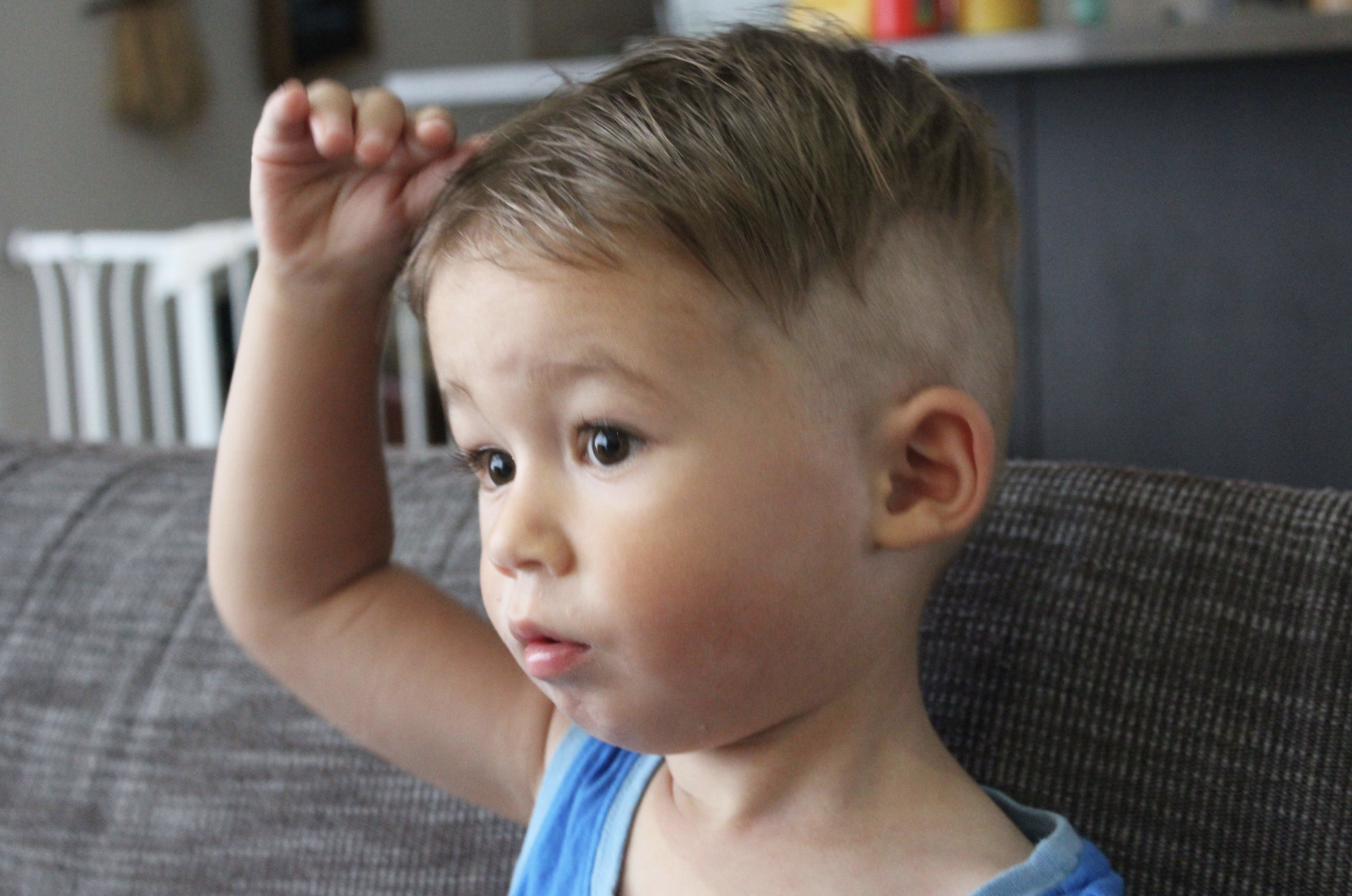
I Worked Hard to Get My Son Back from Shelter, but When I Got There He Was Gone – Story of the Day
I want to share my story about a young widower who had to raise his son alone until he was taken away by social services. To get him back, I almost lost my life. After enduring many hardships, I returned only to discover that his biological father, whom I never knew about, had already claimed him.
It was Monday, a day etched in my memory as clearly as if it had happened yesterday. This day held a weight like no other, the kind that could tilt the scales of our lives — mine and little Peter's — towards a new beginning. A beginning free from the shackles of debt, from the monotony of cheap meals, and from the necessity of incessant scrimping.
My name is Thomas. Back then, I was 25, a young man with more responsibilities than years. And a widower. Linda, my wife, had passed away 13 months prior, her life slipping away during childbirth, leaving behind a void that no words could fill. The doctors, despite their best efforts, couldn't save her. Since that day, it had been just Peter and me, alone in a world that seemed too big and too harsh for our small, fractured family.
Life as a single father was a relentless marathon with no finish line in sight. Each day began with Peter's cries piercing the quiet of dawn, his voice a stark reminder of the new reality that was mine to shoulder. Sleep was a luxury I scarcely remembered; my eyes perpetually shadowed and my mind often clouded with fatigue.

Headshot portrait of cute baby boy with finger inside his mouth eating snack at home. | Source: Shutterstock
Feeding Peter was a task that tested both patience and creativity. He was particular about his food, often turning his face away from the spoon I'd bring to his lips, his tiny mouth clamped shut. In those moments, I'd think of Linda and how effortlessly she seemed to understand our son. I'd try different baby foods, making playful airplane noises, anything to coax a few spoonfuls into him.
The rest of the mornings were a blur of diaper changes and baby talks, of finding clean clothes for him and then for myself. I'd often find myself talking to him about everything and nothing — about the job I hoped to land, about how proud Linda would have been of him, about the life I wished for us. It was a one-sided conversation, but in Peter's gurgles and smiles, I found the strength to keep pushing forward, to keep believing in a better tomorrow.
That day I woke up to the sound of Peter's crying, his little voice cutting through the silence of the early morning. Glancing at the alarm clock, my heart sank. I was late for the restaurant interview. Today was crucial; I had an interview for an administrator position at a restaurant owned by Arnold's father. Arnold, a good friend, had convinced his dad to consider me for the job. I just needed to show up and make a good impression.
Scrambling out of bed, I rushed to Peter's crib. "Hey, little guy," I said softly, picking him up. His tears began to subside as I held him close, feeling his small heartbeat against mine. The clock was ticking, but for a moment, I let the stress of the interview slip away, focusing only on comforting Peter.
Once he was calm, I carried him to the kitchen. Breakfast was a simple affair; I mashed some bananas, his favorite, and mixed them with a little cereal. "Open wide for the airplane," I cooed, gently flying the spoon towards his mouth. He giggled, making a mess as he tried to grab the spoon. I couldn't help but smile; these moments were precious, even in the rush of the morning.
After feeding Peter, I quickly gathered his things. Diapers, a change of clothes, his favorite stuffed bear, and some extra food — I double-checked to ensure I hadn't missed anything. Mrs. Warren, our kind neighbor, had agreed to look after Peter while I was at the interview. She had been a godsend ever since Linda passed away, always ready to lend a hand.
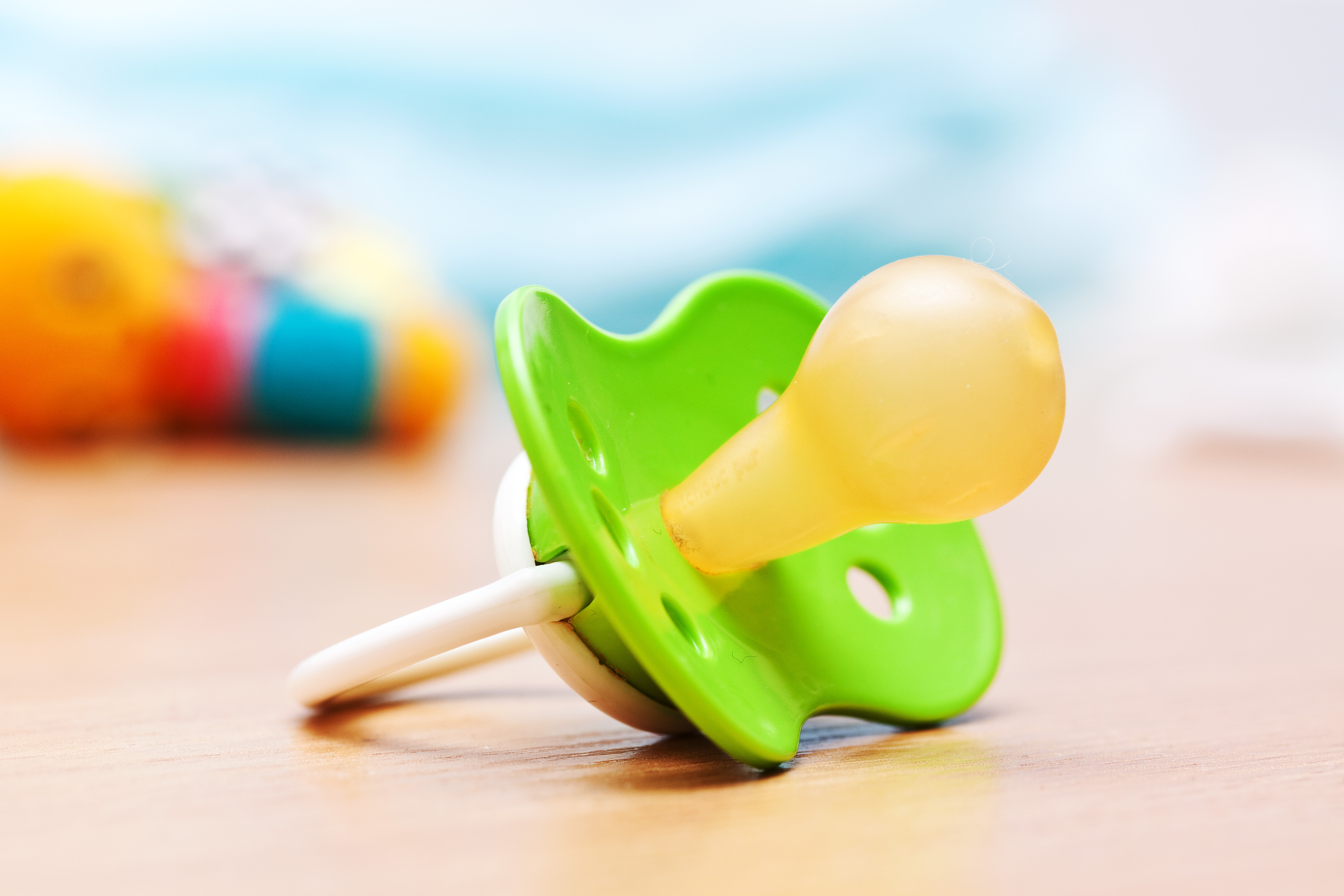
Baby's dummy. | Source: Shutterstock
"Let's get you ready," I said to Peter, changing his diaper efficiently despite his playful squirming. Dressing him up, I chose a blue onesie that Linda had picked out before she left us. It was getting a bit snug on him, a sign of how fast he was growing.
Once Peter was all set, I quickly dressed myself, opting for the only suit I had — my prom suit, now slightly faded but still presentable. I looked at Peter, now quietly playing with his bear. "We'll be back on track soon, buddy," I whispered, more to myself than to him, filled with a hope that today might just be the start of a new chapter for us.
After I had collected Peter's things and dressed him in his little blue onesie, I hurried to dress myself. I pulled on my prom suit, the only one I owned, its fabric a little worn but still presentable. Holding Peter in my arms, his tiny hand clutching my finger, I was ready to leave. But as I opened the door, my heart sank. Standing in the doorway of our modest trailer were a woman and a man, looking official in their formal attire. The woman, who looked to be in her forties, had a stern expression that didn't bode well.
"We're from social services," she announced. "We've come for Peter."
My heart raced. This wasn't the first time she'd threatened to take him away, citing our poor living conditions and my unstable financial situation. I had debts, fines, and overdue utility payments. But this visit felt more serious, especially as she showed me an official document granting them permission to take Peter.
"You can't do this!" I protested, clutching Peter a little closer. "I'm turning things around. I have a job interview today. Things will get better, I promise."
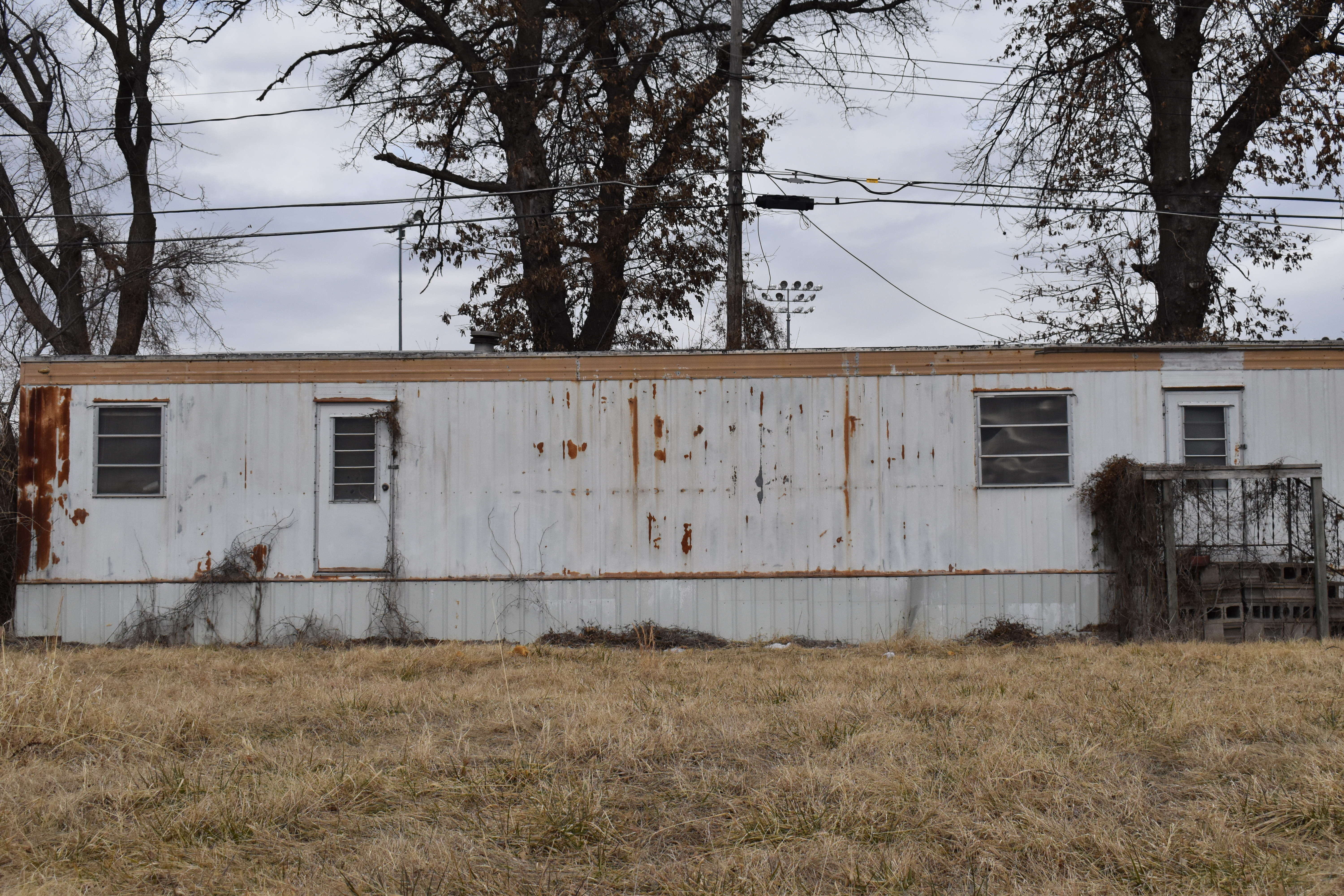
Trailer house with a yard. | Source: Shutterstock
Her gaze didn't waver. "I've heard these promises before, Thomas. We have to think about the child's welfare. We're taking him."
In desperation, I mentioned Mrs. Warren, our neighbor who often helped by watching Peter. "She can vouch for me! Just let me go to this interview."
But the sight of red rashes on Peter's skin seemed to solidify her decision. "Your neighbor's support isn't enough. We need to see stable change," she said firmly.
Feeling helpless, I asked, "If I land this job today and start clearing my debts, can I get him back?"
"Secure a stable income and a proper living environment. Then we'll talk," she replied, her tone final. With that, she and her colleague took Peter from my arms. His confused and scared expression tore through me.
As they drove away, I glanced at my watch. I was now almost an hour late for the interview. Panic set in, but I knew I couldn't give up. Not now. With a heavy heart, I locked the door and sprinted to the bus stop, the weight of the situation pressing down on me. The job at the restaurant wasn't just an opportunity now; it was a lifeline.
I jumped off the bus, my heart pounding, and raced down the street towards the restaurant. It was only a five-minute walk from the stop, but I ran as if my life depended on it. People on the sidewalk became blurred figures as I dodged and weaved through the crowd, mumbling apologies to those I bumped into. My breath was heavy, my suit clung to me uncomfortably, but all I could think of was getting to that interview on time.
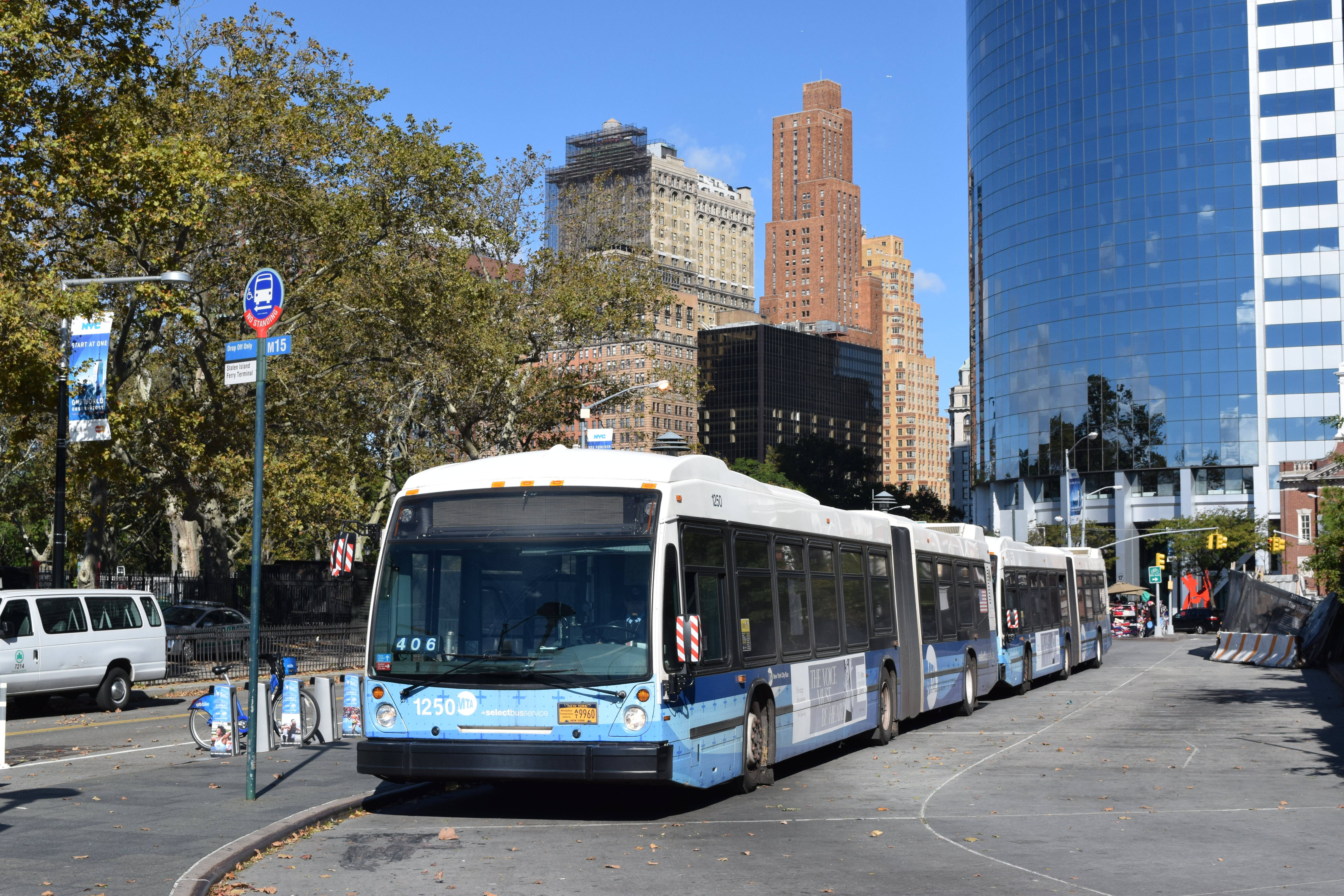
Public bus. | Source: Shutterstock
As I burst through the restaurant's front door, I spotted Arnold right away. He was standing beside his father, Mr. Green, the owner of the establishment. Arnold's face was a mix of concern and annoyance. It was clear he knew about my tardiness. My heart sank a little more, but I couldn't afford to back down now, not when so much was at stake.
With whatever breath I had left, I approached them. My hands were shaky, my forehead dotted with sweat, but I tried to muster as much composure as I could.
“Good afternoon, Mr. Green, my name is Thomas. Arnold should have told you about me. I am a candidate for the position of administrator of your restaurant,” I said, trying to sound confident as I handed him a folder containing my resume.
Mr. Green barely glanced at me or the papers I offered. "Goodbye, man," he said dismissively, turning back to continue his conversation with Arnold.
Desperation crept into my voice as I interjected, "I know I'm late, and I'm truly sorry. I had an emergency with the guardianship authorities concerning my son.”
Mr. Green finally turned to me, his expression stern. "Thomas, is it? Look, we need someone responsible, someone who can not only manage themselves but also our entire staff. Punctuality is key in this business. If you can't be on time for your interview, how can we trust you to run our restaurant?"
I felt my face flush with a mix of embarrassment and frustration. "Please, sir, if you just let me explain. It was an emergency with my son, something I couldn't control. I assure you, this isn't a reflection of my work ethic or organizational skills. I really need this job."
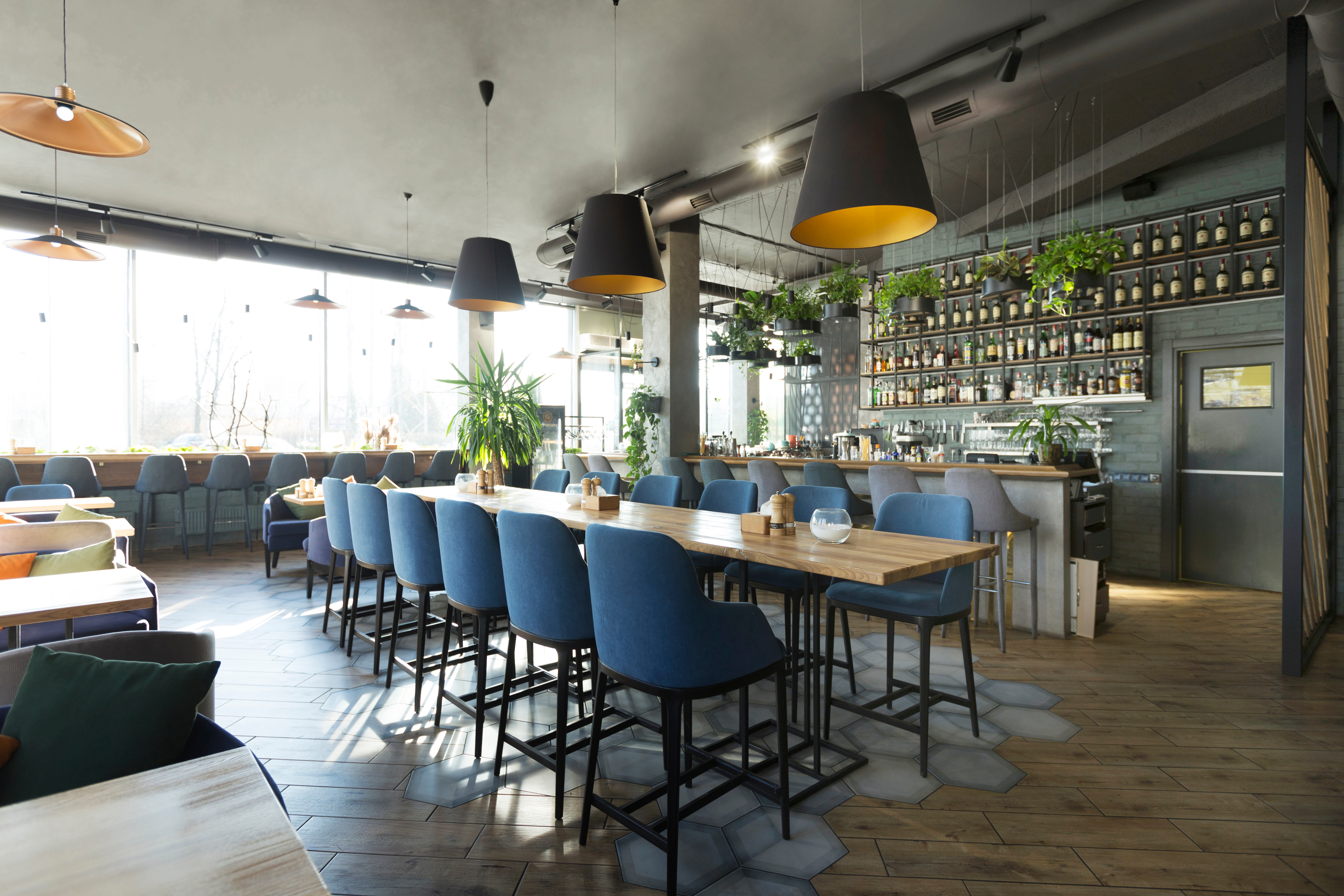
Stylish restaurant interior for dinner and rest. | Source: Shutterstock
Arnold chimed in, trying to ease the tension. "Dad, Thomas is a hard worker, and he's been through a lot. Maybe we could—"
Mr. Green held up his hand, stopping Arnold mid-sentence. "I sympathize with your situation, Thomas, but business is business. We can't afford to take risks. I'm sorry, but you're not what we're looking for."
My heart sank. I stood there for a moment, the weight of his words crushing me. It wasn't just about the job anymore; it was about getting Peter back, about proving that I could be the father he deserved.
I swallowed hard, feeling defeated. "I understand, Mr. Green. Thank you for your time," I said quietly, my voice barely above a whisper. As I turned to leave, the reality of my situation hit me. I had lost the job opportunity and, even worse, my son. I walked out of the restaurant, feeling more lost than ever.
As I trudged out of the restaurant, my steps heavy with defeat, Arnold hurried after me. He caught up and placed a hand on my shoulder, his face filled with sympathy. "Thomas, I'm really sorry. My dad's strict about time. He wouldn't have seen you even if you were a minute late. It's just how he is," Arnold explained, his voice tinged with regret.
I sighed, feeling the weight of my situation. "Arnold, what am I supposed to do now? I've lost my chance at the job, and without it, I can't get Peter back. I've got nothing left," I said, the words tasting bitter.
Arnold looked at me, his eyes reflecting a mix of concern and understanding. "I wish I could do more to help, Thomas. This is really tough."
In that moment of despair, all I wanted was to escape, even if just for a little while. "I need to clear my head. Let's go to a bar. I could use a good beer," I said, trying to mask the hopelessness in my voice.
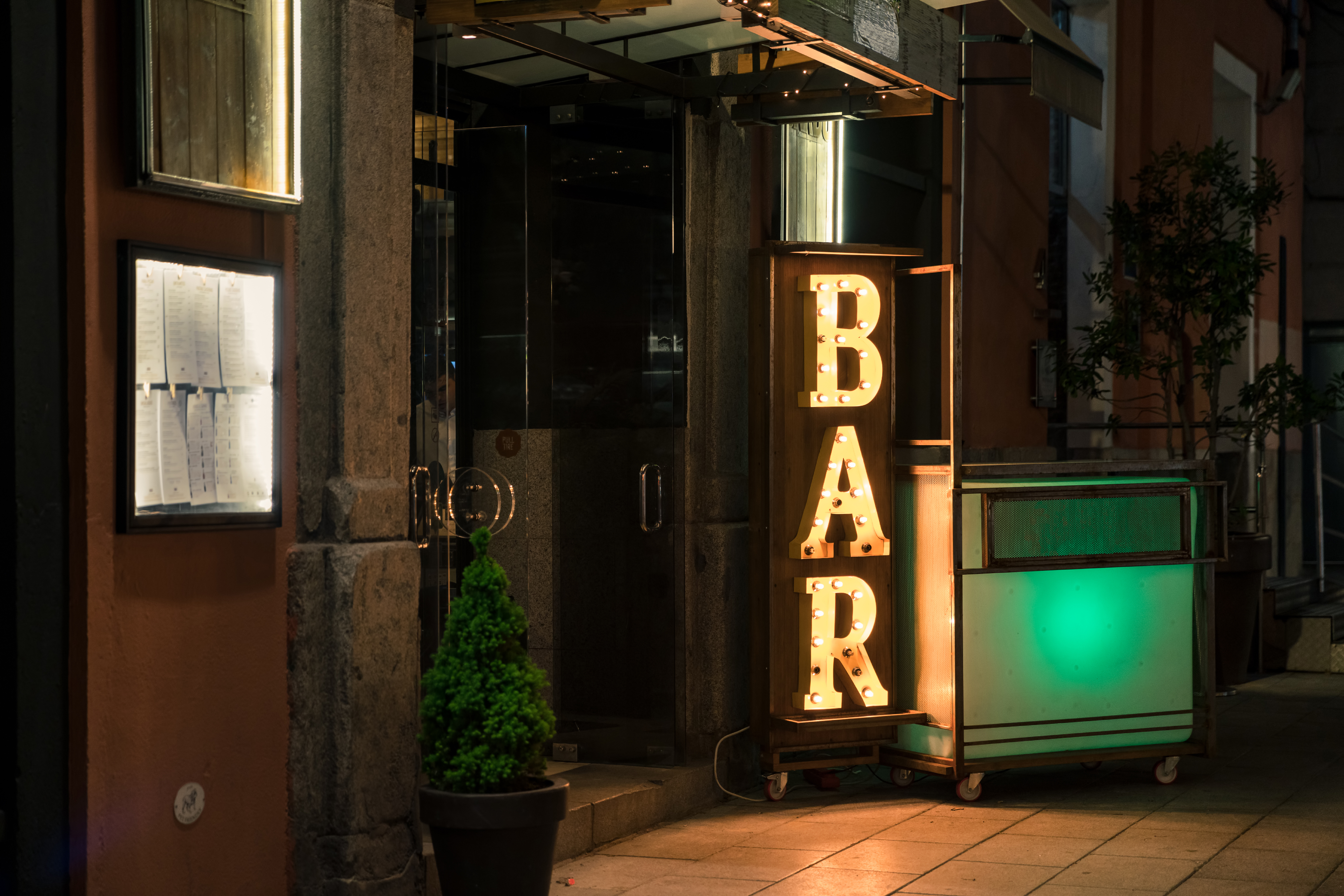
Bar Electric Light Sign From Outside. | Source: Shutterstock
Arnold nodded. "Alright, let's go. I'll join you. Maybe it'll help to talk it out, you know?" he suggested.
We walked side by side in silence, each step taking us further from the shattered hopes of the day. The bar seemed like a small refuge, a place to momentarily forget the overwhelming challenges waiting for me outside its doors.
Sitting at the bar with Arnold, I nursed my beer, the cold bitterness of the drink mirroring my thoughts. The dim lighting of the bar and the low murmur of conversations around us created a somber atmosphere. I tried to hold back my emotions, but the dam broke. Tears streamed down my face, a silent testament to the misery and ruin my life had become. Arnold, looking uncomfortable but concerned, put a reassuring hand on my shoulder.
"Don't give up, Thomas," he said softly. "There's always a way out. You're a strong guy."
I just shook my head, feeling anything but strong. "I don't see a way out, Arnold. I'm at the end of my rope here."
As I wiped my eyes, trying to regain some composure, a loud, enthusiastic voice from the next table caught my attention. "There's a huge salary in it! I almost paid off my house in just 5 months, you understand? I'm heading back in a week!"
Curiosity piqued, I turned to see a rugged-looking man, animatedly talking to his companions. Pushing my despair aside, I approached him. "Excuse me, I couldn't help but overhear. What job are you talking about?"
The man turned to me, his eyes bright with excitement. "Ah, I work in Alaska, on a fishing boat. We catch crabs, king crabs. Dangerous but pays like a dream." His enthusiasm was infectious, even in my gloomy state.
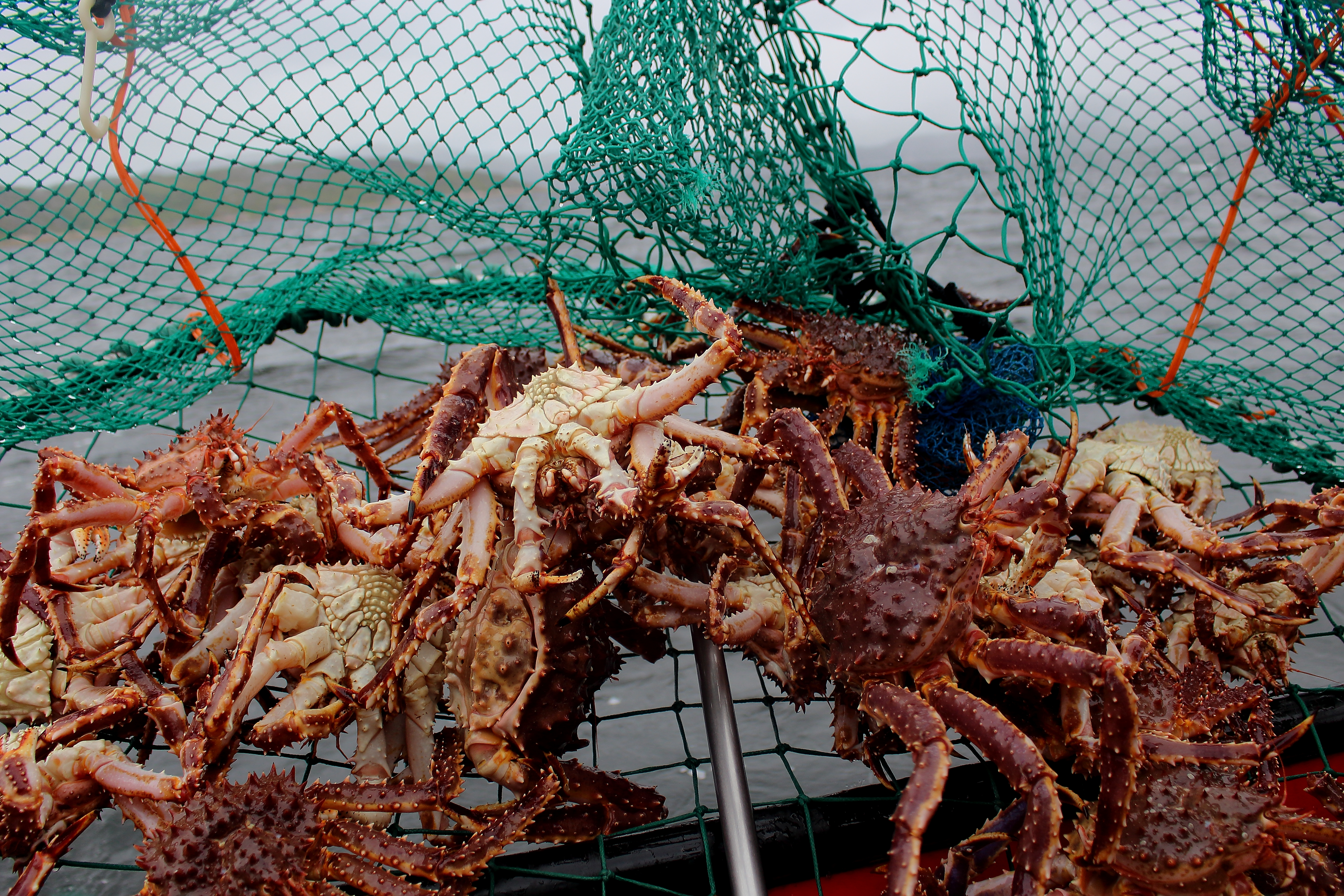
Landscape picture of a crab pot full of king crabs. | Source: Shutterstock
I leaned in, intrigued despite myself. "Can you tell me more? How does one get into something like that?"
For the next couple of hours, we talked. He described the harsh conditions, the icy waters, the grueling work, and the ever-present danger. But he also spoke of the adrenaline, the camaraderie among the crew, and, of course, the money. "Not everyone's cut out for it," he admitted. "Some folks quit after a week. But if you stick it out, it's worth it."
I listened, absorbing every word. Here was a glimmer of hope, a lifeline in my sea of troubles. "Do you think you could help me get a job there?" I asked, a flicker of hope igniting in my chest.
He clapped me on the back, "Sure thing! Here's my number. Give me a call, and I'll talk to my captain. We're always looking for hands."
I thanked him and returned to my seat, the man's number clutched tightly in my hand. For the first time in what felt like forever, I felt a spark of something like hope. Maybe, just maybe, this could be my chance to turn things around
Just two weeks after that conversation in the bar, I found myself on a fishing boat, surrounded by the vast, relentless ocean. We were there to catch king crabs, a task that was as daunting as it was dangerous. The process was a grueling dance with nature. We would set out large, steel traps, known as pots, baiting them with herring or cod to lure the crabs. These pots would then be dropped into the icy depths, marked by buoys for us to find later.
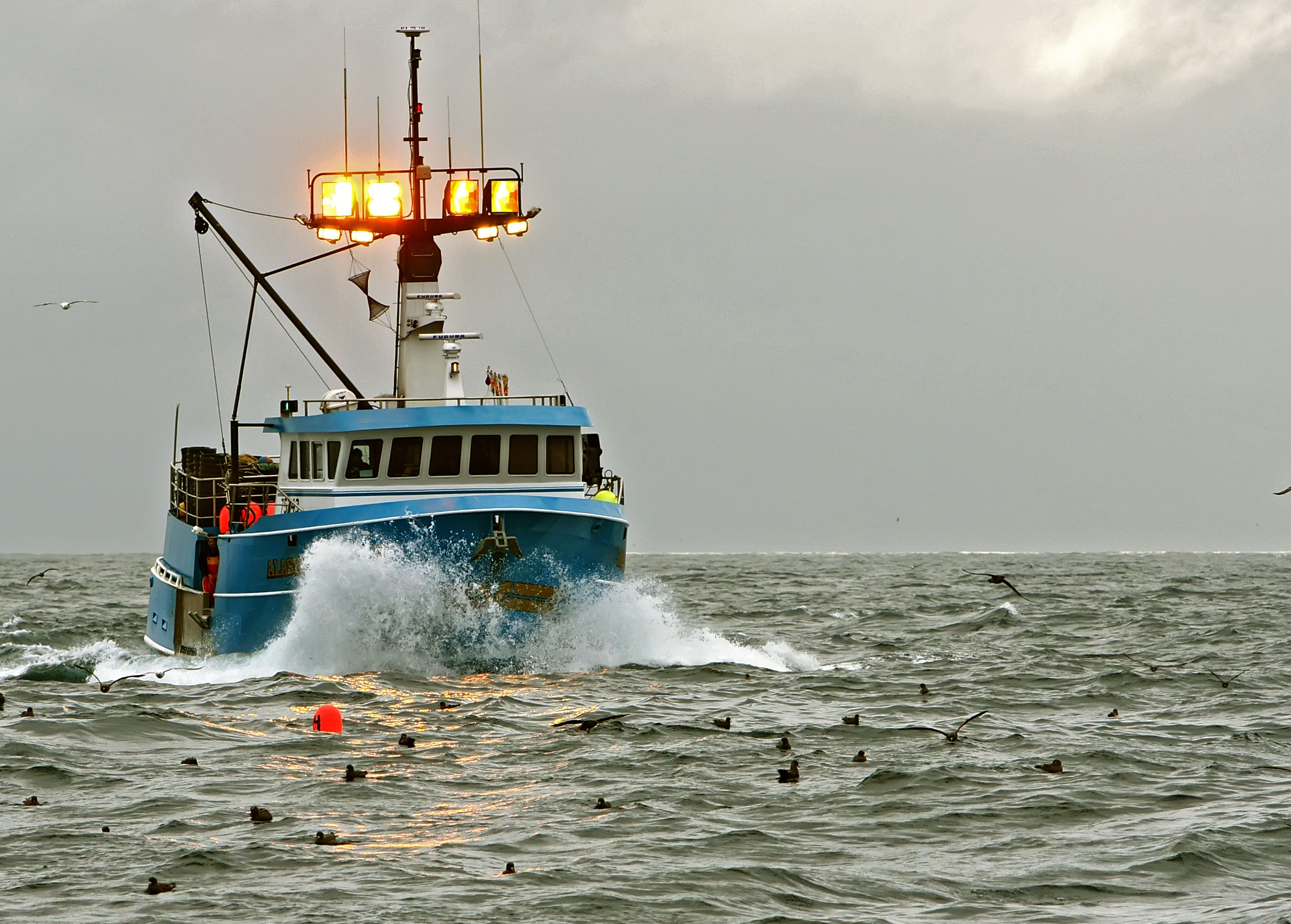
Fishing boat. | Source: Shutterstock
The work was taxing, especially at night under the cold, starlit sky. The sea was a different beast in the darkness, both beautiful and treacherous. We would haul up the pots, heavy with crabs, their spiky legs tangling and clacking. Each crab was a small victory, a glint of gold in our laborious quest. But the joy was short-lived as we had to sort them quickly, keeping the ones of legal size and tossing the others back into the ocean's embrace.
We spent days, sometimes a week or even ten days, in the open sea. The boat became our entire world, rocking and swaying with the whims of the waves. During that first month, the sea showed no mercy. I was constantly seasick, my body rebelling against the rolling tides. Sleep was a stranger; I would lie awake in my bunk, the boat's creaks and groans a constant reminder of where I was. Fatigue became my shadow, clinging to me during the long hours of work. There were moments when I felt so drained that I passed out, right there on the deck, amidst the day's catch.
Six months passed in this rugged routine. As hard as it was, I couldn't have imagined that this would be the easier part of my journey. What I faced on that boat was just the prelude to a far more harrowing ordeal that lay ahead.
That day, the boat was anchored, and I was on land for a crucial meeting. I needed to talk to Gary, our captain, about my salary increase. I'd been working tirelessly, and it felt like the right time to address my pay. As I approached the headquarters, a small, nondescript building near the docks, I felt a mix of determination and nervousness.
Unannounced, I neared the captain's office, ready to present my case. But as I got closer, muffled voices from inside halted my steps. It was Will, Joe, and Roger – three crew members known for not being the friendliest. Their rough demeanor and crude jokes never sat well with me. They were talking to Gary, their tones serious, a stark contrast to their usual banter.
Curiosity piqued, I paused by the door, intending to knock but instead, I overheard their conversation. Will's voice was tense, "…but people will die! Are we aware of this?” There was fear, a rare emotion from him.
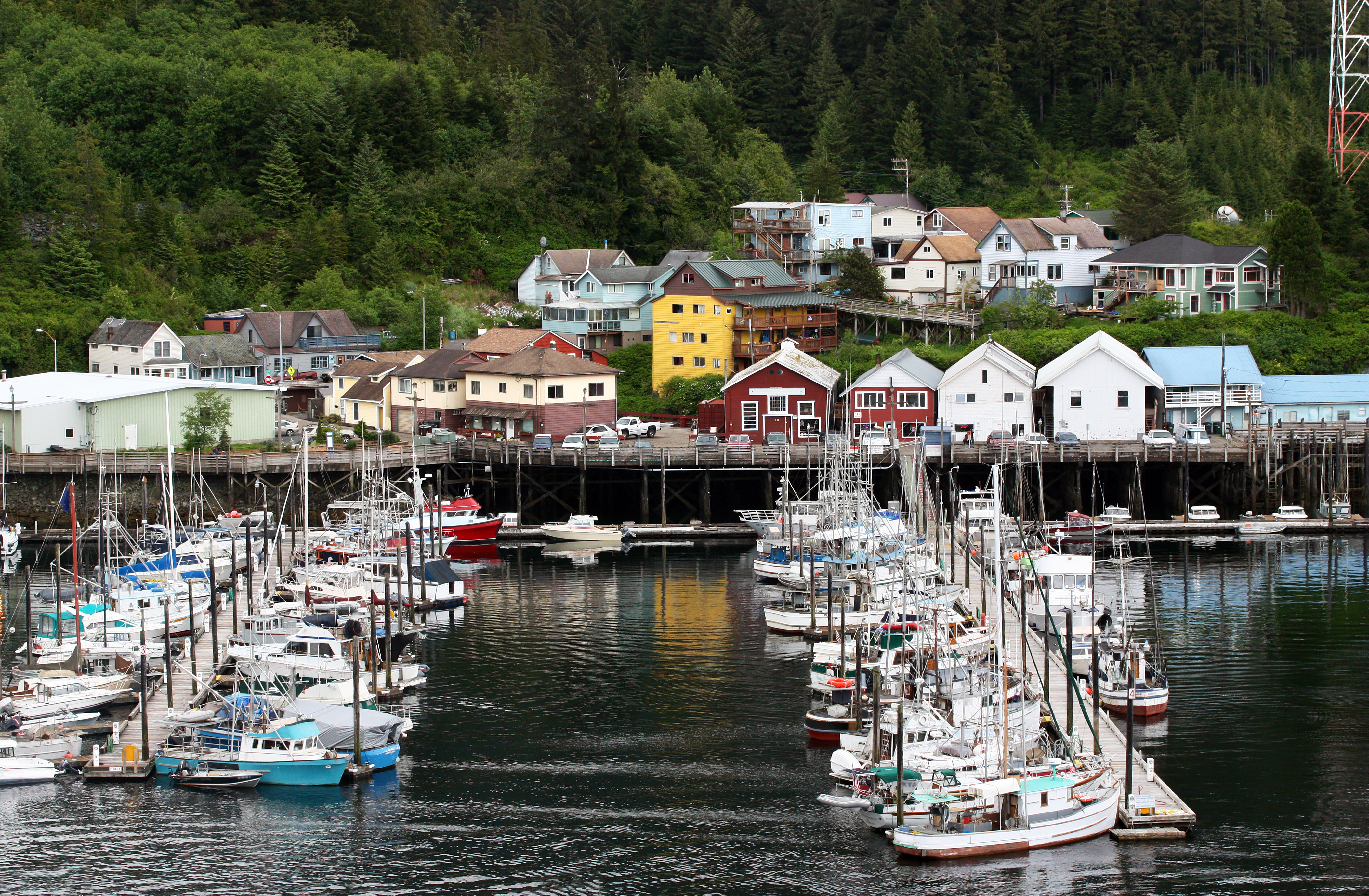
Alaska from the waterfront. | Source: Shutterstock
Gary's response was cold, detached. "Think about money, not about people," he said.
The words sent a shiver down my spine. What were they planning? My mind raced with possibilities, none of them good. At that moment, I saw a shadow move across the small window in the door. They must have seen my silhouette because the conversation abruptly shifted.
I backed away from the door, my heart pounding. Questions swirled in my head. What kind of plan involved people dying? Were they serious, or was this just some twisted joke? I couldn't shake the feeling of unease that clung to me. I decided to leave, not wanting to confront them or reveal that I had overheard their conversation.
As I walked away, the weight of their words stayed with me. I had come to discuss my salary, but now, a sense of dread overshadowed my initial purpose. What was happening on our ship? The unease gnawed at me, but little did I know, it was just the beginning of something far more sinister.
The next day, as we headed out into the open ocean, the vastness of the sea stretched endlessly before us. Our plan was to stay out for about 5-6 days, but fate had other plans. On the second night, a storm unlike any I had ever seen engulfed our ship. The winds howled like angry spirits, and the waves rose like mountains, threatening to swallow us whole.
Inside the ship, tension was as high as the storm outside. The crew, all nine of us, were visibly shaken. Some started to demand that we head back to shore, their voices laced with fear and urgency.
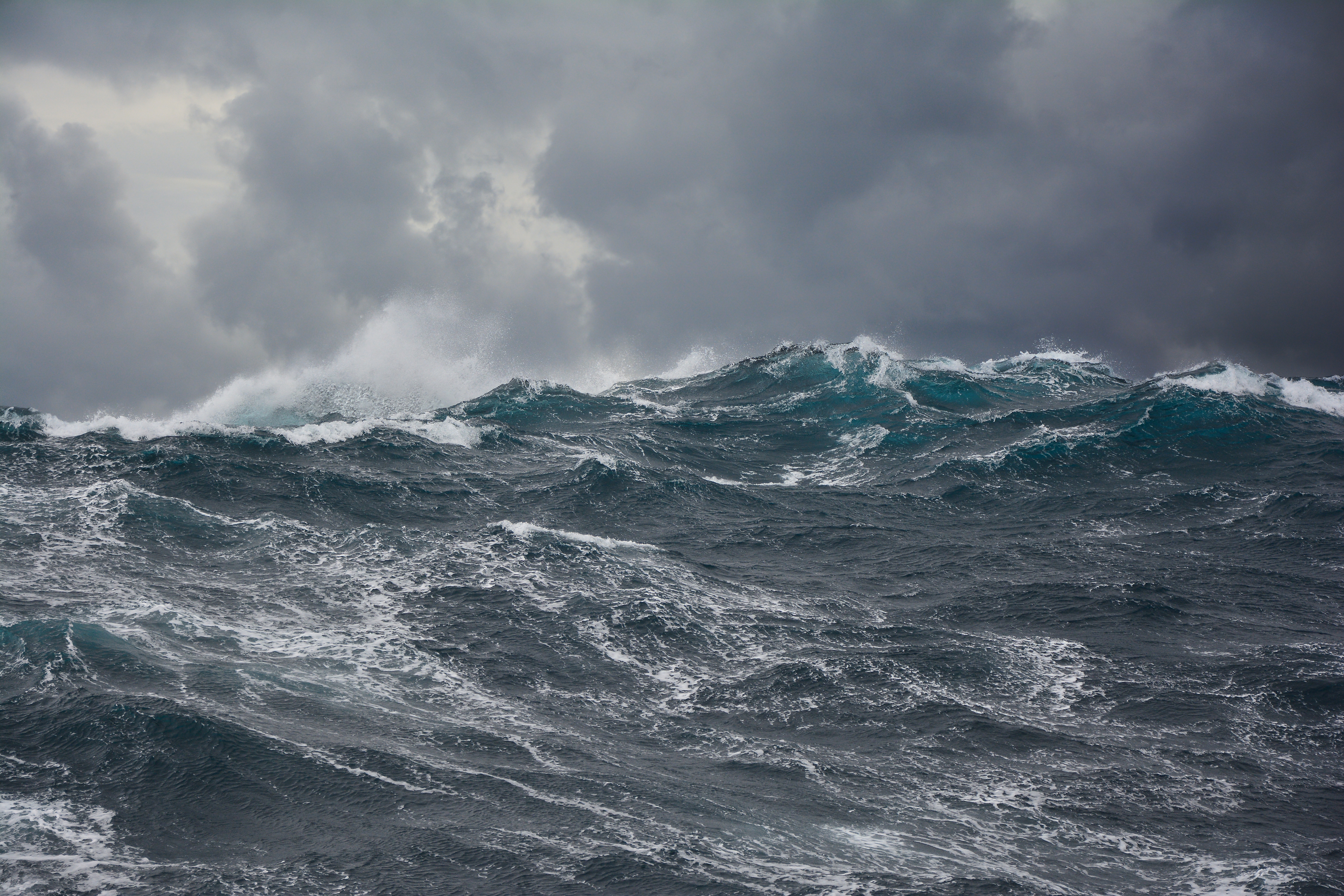
Ocean Storm. | Source: Shutterstock
The captain, a seasoned man with a face weathered by the sea, was firm. "If we head back now, we'll lose everything we've worked for. The traps we set on the ocean floor will be taken by poachers. That's a loss we can't afford. The company will fine us, and none of us will see our salaries this month. Moreover, we will be fired!" he explained, his voice rising above the roar of the storm.
He proposed a vote, a democratic way to decide our fate. The tension in the air was palpable as each member cast their vote. The result was a perfect split — four wanted to return to shore, and four wanted to stay and brave the storm. The deciding vote was mine.
I stood there, feeling the weight of the decision on my shoulders. My mind raced to Peter, my little boy waiting for me. If I lost this month's salary and the job, it would set me back even further from reuniting with him. I couldn't afford that. With a heavy heart, I made my choice.
"We're staying," I declared, my voice barely audible over the storm.
The captain nodded solemnly, and we prepared to face the storm head-on. As the ship rocked violently, I held onto whatever I could, bracing myself against the unrelenting fury of nature. Each wave that crashed against the ship felt like a direct challenge to my resolve to get back to Peter. But amidst the chaos, I found a strange sense of determination. I had to survive this, for him.
That night was the hardest of my life. The storm raged around us, the sea an angry beast trying to swallow our ship whole. Inside, we worked together in a desperate attempt to save the boat and ourselves. We bailed water that splashed over the sides, securing any loose gear that threatened to become dangerous projectiles. The crew, usually so rough and rugged, worked in unison, a symphony of survival against the relentless assault of nature. Our shouts were lost in the howling wind as we coordinated our efforts, trying to keep the ship afloat.
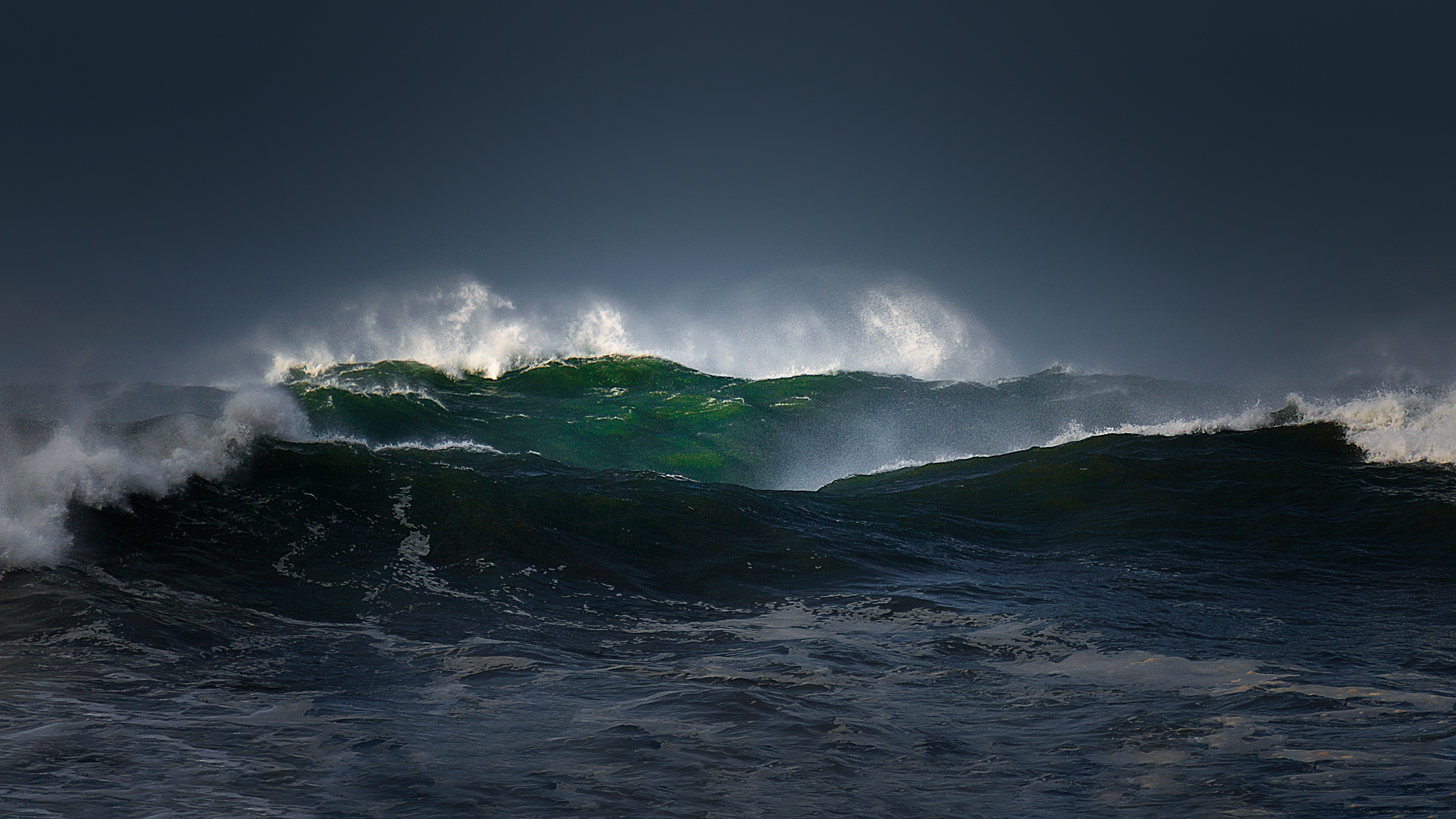
big waves with a stormy weather. | Source: Shutterstock
But as the night wore on, a sinking feeling of helplessness settled over us. The storm was winning. Our ship, battered and beaten, began to tilt dangerously, water flooding the deck faster than we could clear it. Panic set in as the realization dawned on us - we were going down.
The captain's voice cut through the chaos, ordering the lifeboats to be launched. I noticed something odd then. The captain, Will, Joe, and Roger quickly got into one boat, which seemed suspiciously well-prepared with bags and provisions. It was as if they had anticipated this disaster.
The rest of us scrambled to launch the other boat. We gathered whatever floated - bags, rucksacks, anything that might be of use in the open ocean. We were in survival mode, acting on instinct more than thought. With no sight of the coastline and the storm obscuring the stars, we had no idea which direction to row. We were adrift, 50 miles from shore, at the mercy of the sea.
We rowed with all our might, but the storm was relentless. Waves crashed over us, threatening to capsize our small boat. We fought against the tide, our arms burning with exhaustion, our spirits battered by the ferocity of the storm. The cold seeped into my bones, sapping the last vestiges of my strength.
In those moments, my thoughts turned to Peter. I wondered if I would ever see him again, if he would ever know how hard I fought to get back to him. The combination of exhaustion, fear, and the cold was too much. My oars slipped from my hands, and darkness crept into the edges of my vision. The last thing I remember was the sound of the storm, like a roaring giant claiming its victory, before I succumbed to unconsciousness.
As consciousness slowly crept back to me, I felt the urgent, rough shake of hands. My first groggy thought was a flicker of hope - maybe it was the coast guard, or doctors, and we were safe. But no, as my eyes fluttered open, I realized it was Kieran, one of the crew members who had been in the lifeboat with me.
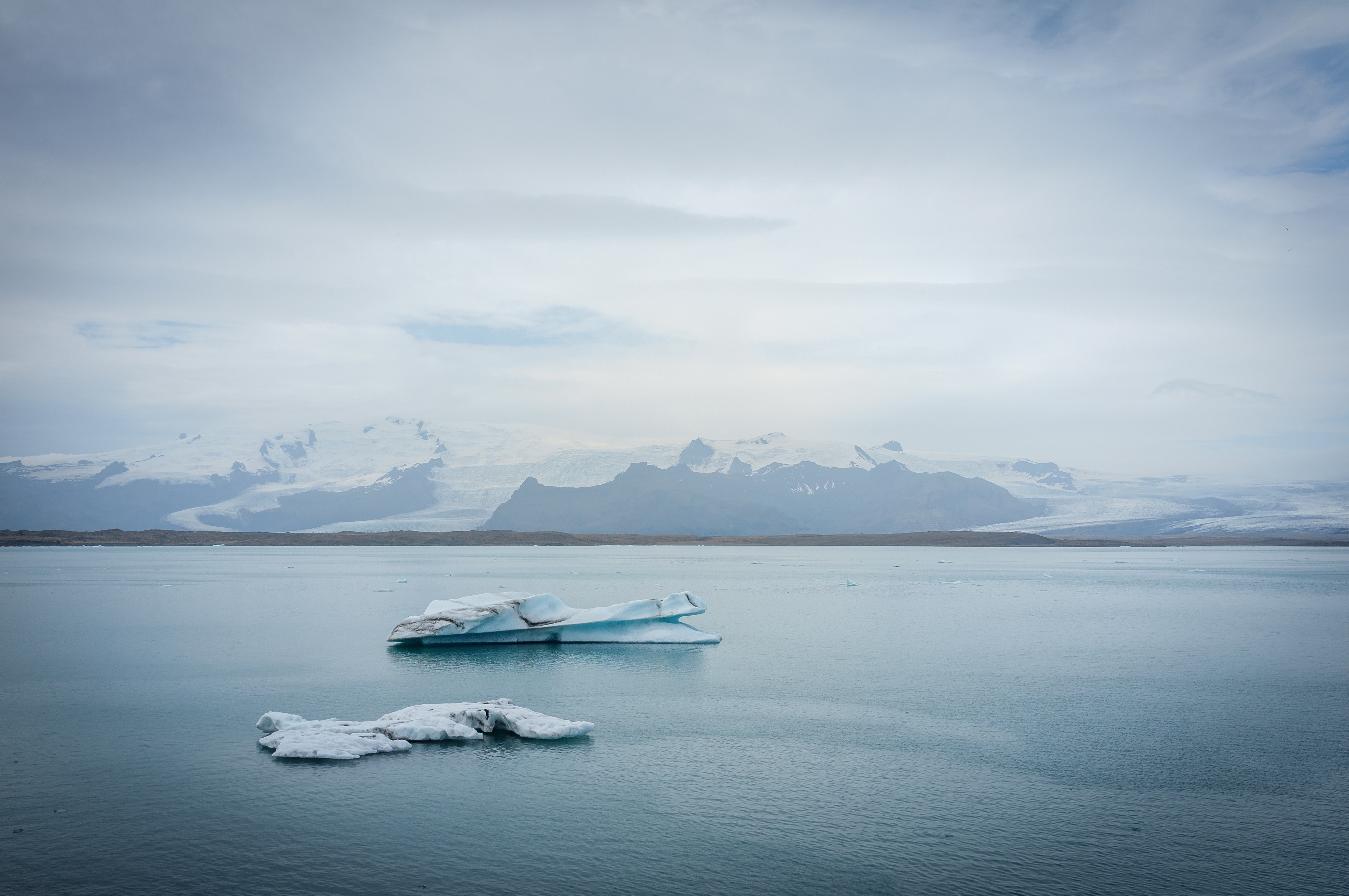
Pieces of ice in glacier lagoon bay. | Source: Shutterstock
Blinking against the harsh light, I croaked out, "Where are we?"
Kieran's face, etched with weariness and worry, looked down at me. "We don't know exactly. The waves threw us onto some island," he said, his voice barely above a whisper.
I sat up, my body protesting with aches, and looked around. A desolate landscape of snow and ice stretched before us, barren of trees or any signs of life. It was a stark, alien place, clearly untouched by humans. Beside Kieran, I saw Mike, another crew member, his face reflecting the same shock and disbelief I felt. We were three, stranded in this frozen nowhere. The fate of the others from our ship was unknown, but the grim reality of our situation was clear – survival here, especially in the harsh Alaskan waters, was a slim chance.
We started to gather the debris that had washed ashore with us. Each item we found was a small victory – a can of food, a piece of cloth, anything that could be of use. We sorted through bags and boxes, assessing what little we had. It was a meager inventory: some food, a few warm items, but crucially, no phone or any means to call for help.
The starkness of our situation settled on me like a heavy coat. We were alone, cut off from the world, with only the cold, unyielding island as our companion. The thought of Peter, waiting for me somewhere, kept playing in my mind, a beacon of hope in the overwhelming despair. We needed to survive, to find a way back. For him, I had to make it.
With a sense of urgency, we gathered stones from the frozen ground, our fingers numb as we arranged them into the giant letters spelling "HELP." We were driven by the hope that rescue helicopters would spot this desperate signal from above. As we worked, the sky darkened into evening, and the cold seeped deeper into our bones.
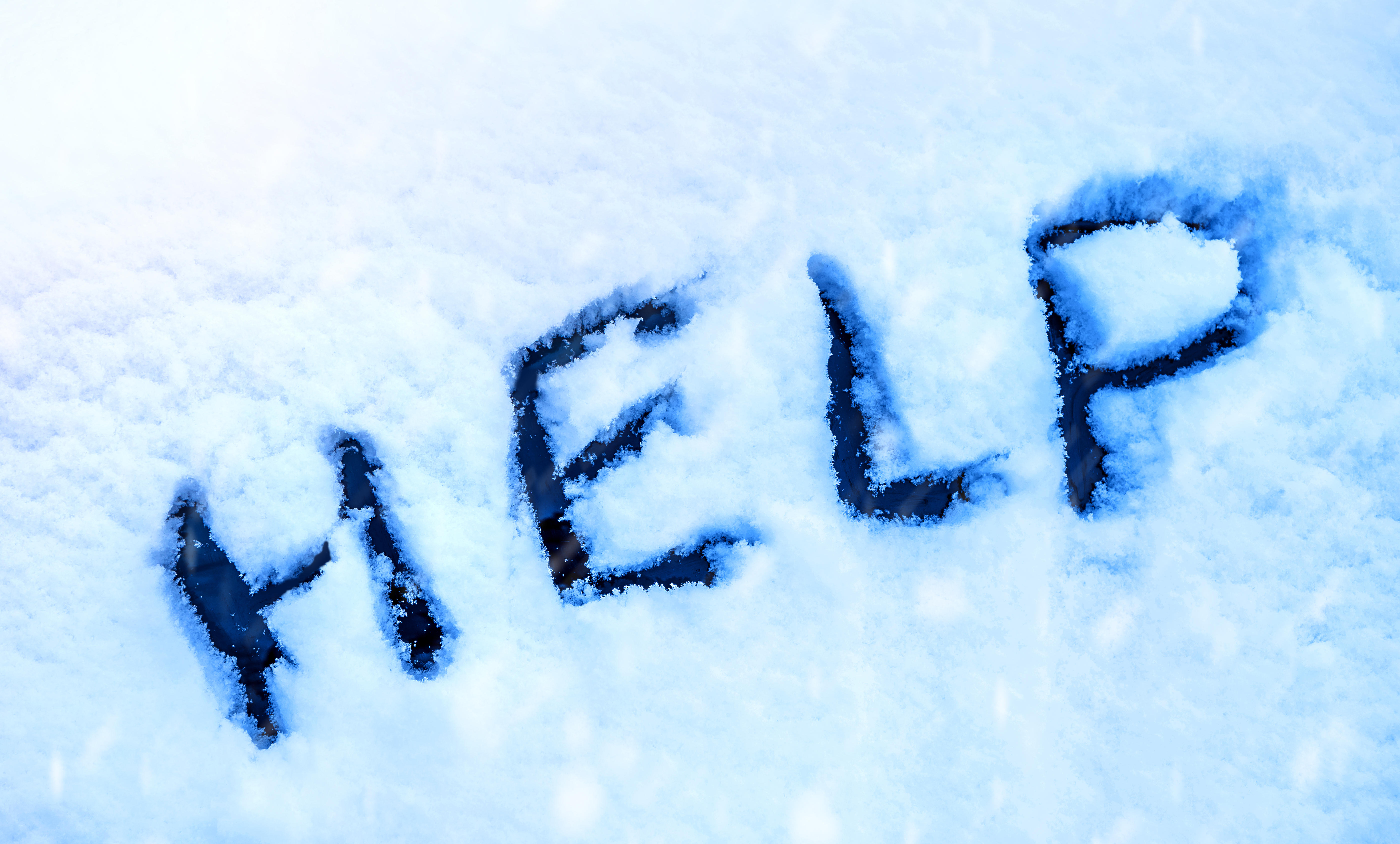
Word Help, written on a snow. | Source: Shutterstock
Realizing the need for warmth, we turned our efforts to building a fire. We scoured the icy landscape for anything that might burn, but our attempts were futile. Everything was drenched, the wood we found too wet to catch a spark. Our situation was growing more dire by the minute.
As the temperature plummeted, we huddled together for warmth, a makeshift family borne of circumstance. We wrapped ourselves in the torn fabric we had salvaged, pieces of our past life that now served as our only shield against the cold. The fabric was thin and offered little comfort against the biting chill of the island.
Lying there, shivering in the dark, sleep was an elusive dream. Our teeth chattered relentlessly, the sound a constant reminder of the harsh reality we faced. My thoughts wandered to Peter, my little boy waiting for me in the shelter. The thought of him, so innocent and unaware of my plight, fueled a fire within me. I had to survive, not just for myself, but for him. He was the beacon in my darkest moments, the reason I couldn't give in to despair.
That night, as we lay in the cold, sleepless and scared, it was the thought of Peter that kept my spirit alive. I clung to the hope of seeing his face again, of holding him in my arms. It was a father's love that kept me going, a love that refused to be extinguished, even by the coldest of nights.
As the first light of dawn broke the horizon, casting a pale, cold light on our desolate surroundings, we noticed that the tide had brought in more debris. With a renewed sense of urgency, we began to sift through the items, hoping to find something, anything, that could aid in our survival.
It was then that I saw it – a body, lying motionless on the shore. My heart sank as I recognized Will, one of the crew who had left with the captain. Rushing over, we found he was still breathing, though barely. His breaths were shallow, ragged, the signs of a man clinging to life by the thinnest of threads.

Portrait of a man in winter clothes and a mask. | Source: Shutterstock
Together, Kieran and I carried Will back to our makeshift camp. We laid him down gently and covered him with whatever we had – torn pieces of fabric, bits of wreckage – trying to provide some warmth. Kieran began to rub Will's legs vigorously, trying to stimulate circulation and warmth, his actions fueled by a mix of desperation and hope.
Meanwhile, Mike and I returned to the shoreline, scouring the debris that the ocean had returned to us. Among the scattered remnants, we found something invaluable – a waterproof bag that belonged to Adam, another crewmate. Inside, we discovered clothes, a few precious chocolate bars, and, most importantly, a pocket radio.
With trembling hands, I turned on the radio, the static crackling before it finally tuned into a station. The broadcaster's voice was somber as he reported the tragic news – the wreckage of our ship had been found, and some crew members were confirmed dead.
"The crew members had almost no chance of survival... The search operation will continue, and we hope that we will be able to find at least the bodies of these people," the presenter said.
Those words struck like a blow. We were presumed dead, just a footnote in a tragic story. But there we were, alive, holding onto hope amidst despair. The radio became our lifeline, a connection to the world we were so desperately trying to return to. Despite the grim news, it gave us a glimmer of hope – they were still searching. And as long as they were searching, there was a chance, however slim, that we could be found.
I urged the guys to prepare everything we would need for a bonfire. The idea was simple yet crucial – if we heard a helicopter, we would light the fire immediately, creating a signal they could see. We gathered dry clothes from Adam's waterproof bag and anything else that could burn, meticulously building the base for our fire.
As we worked, we broke into Adam's stash of chocolate, a luxury in our bleak situation. Each of us received a small piece, a tiny bit of comfort amidst the cold and uncertainty. The chocolate, though meager, was a reminder of normalcy, a taste of a life that seemed so far away now. As I savored the sweet, I found my eyelids growing heavy. Exhaustion took over, and for the first time since landing on this frozen island, I drifted into sleep.
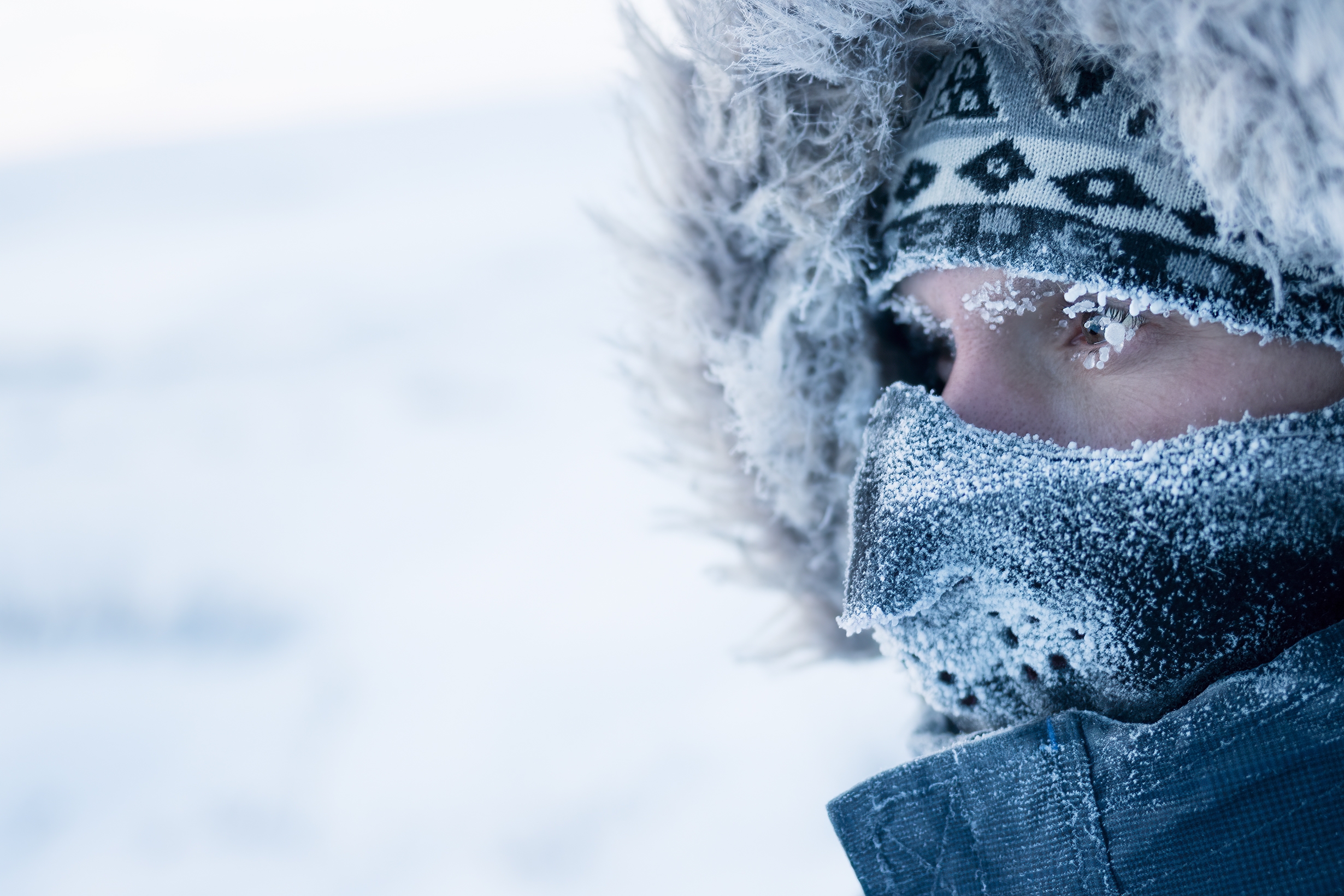
A man in winter clothes and a mask. | Source: Shutterstock
My rest was short-lived. Barely half an hour had passed when Kieran's shouts jolted me awake. "HELICOPTER! HELICOPTER!" he yelled. My heart leaped. This was our chance.
Scrambling to our feet, we rushed to the bonfire, striking matches to ignite the dry materials. We shouted at the top of our lungs, hoping our voices would carry through the wind. But as the fire grew, so did the fog around us. It was thick, a blanket of white that seemed to swallow everything, including the smoke from our fire.
We realized with a sinking heart that our signal was lost in the fog. The sound of the helicopter, initially a beacon of hope, grew fainter, moving away from us. The realization that they couldn't see our fire, couldn't hear our shouts, was crushing. The noise of the helicopter faded until it disappeared completely.
There we were, left in the silence of the fog, our hope dissipating like the smoke into the cold air. The fire crackled before us, a bitter reminder of our missed chance at rescue. We sat there, the three of us, facing the stark reality of our situation. The world was so close, yet we were still so far away, lost in a sea of white, waiting for another chance to be seen.
Just as we were grappling with the despair of the missed rescue, Will, the crew member who had washed ashore with us earlier, stirred back to consciousness. It was a moment of surprise and relief; he was alive and, amazingly, able to speak.
With weak but urgent tones, he began to unravel a shocking tale. He revealed that the ship's captain and three other crew members, including himself, had concocted a harrowing plan weeks ago. Their scheme was to deliberately sink our ship, making it appear as an accident. This way, they reasoned, their families would receive insurance money, a substantial sum of $1 million in compensation for each, under the pretense that they were missing or presumed dead.
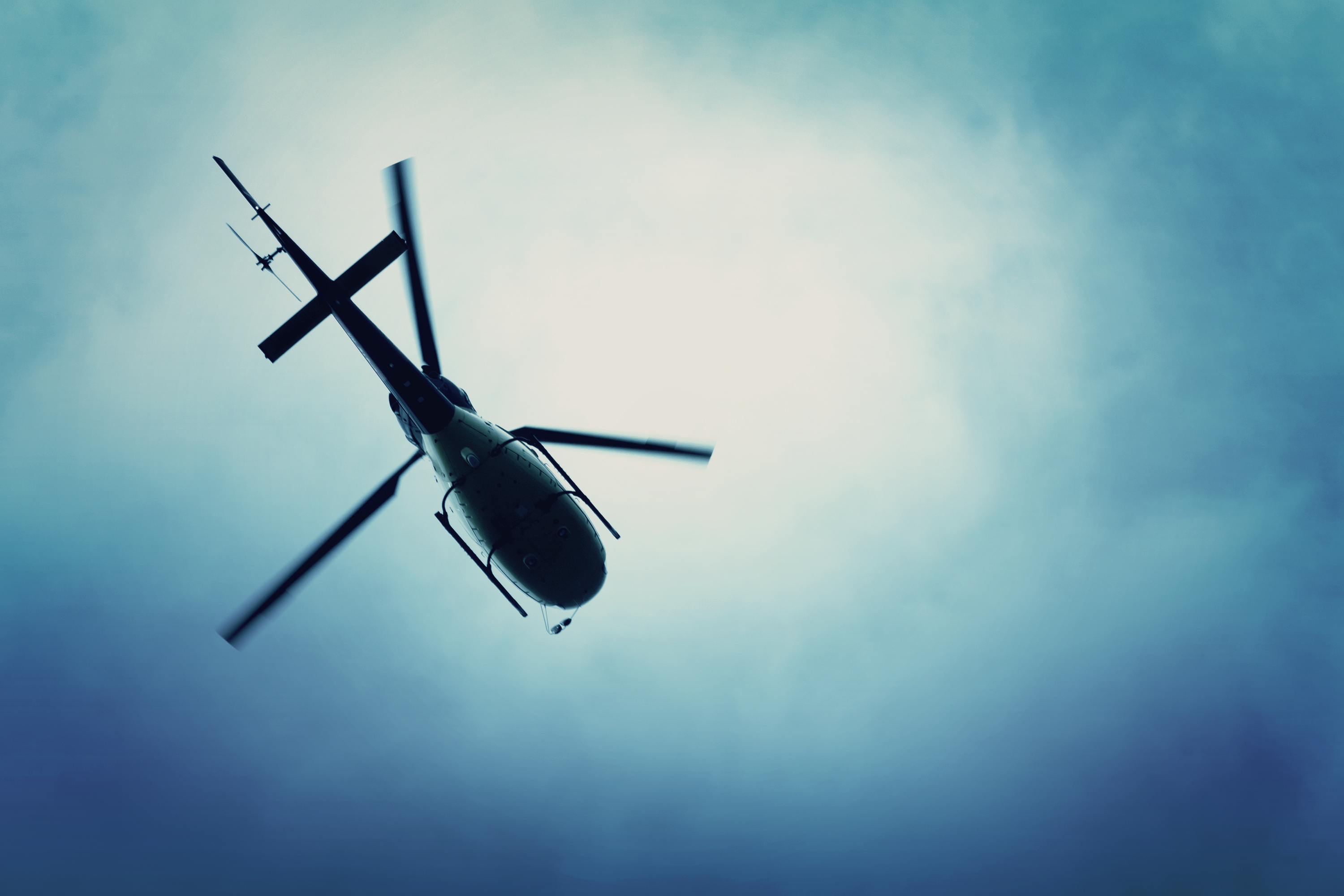
Helicopter flying in the blue sky. | Source: Shutterstock
They had prepared everything meticulously. A special lifeboat was arranged, where they would escape after scuttling the ship, heading to a predetermined location where a car awaited them. Their plan was to hide in an old cabin, lying low for a few months until they were officially declared dead.
But their plan had gone awry. As they were making their escape, the lifeboat began to sink under the weight. In a desperate move to save themselves, they callously threw Will overboard. His recounting was fragmented, the shock and disbelief evident in his voice. He remembered struggling in the water, trying to cling to life, and then everything went dark until he found himself here, on this desolate island with us.
I sat there, stunned by his revelation. The sheer audacity and selfishness of the plan were mind-boggling. To think that people we worked with, whom we trusted, could conceive such a betrayal was chilling. Will's voice trailed off as he recounted his ordeal, and a heavy silence fell over us. We were all lost in our thoughts, processing the depths of deceit and desperation that had led to our current plight. It was a sobering moment, one that starkly highlighted the grim reality of our situation and the lengths some would go to escape it.
As we huddled around the radio, a new message crackled through, bringing news that anchored our fleeting hopes. The anchor's voice was clear, even through the static: the rescue operation was being suspended due to the severe weather conditions and wouldn't resume for another week. A heavy silence fell upon us as the reality of our situation sank in. In these conditions, without adequate food, water, or shelter, surviving more than three days seemed like a distant dream.
Determined not to give in to despair, an idea sparked in my mind. "We need to build a raft," I said, looking around at the others. "We can use tree trunks, any debris we can find, and tie them together. We can make a sail out of the awning pieces we have."
Will, looking skeptical and worn, questioned the plan. "Where will we sail? We don't even know which side of the continent we're on."
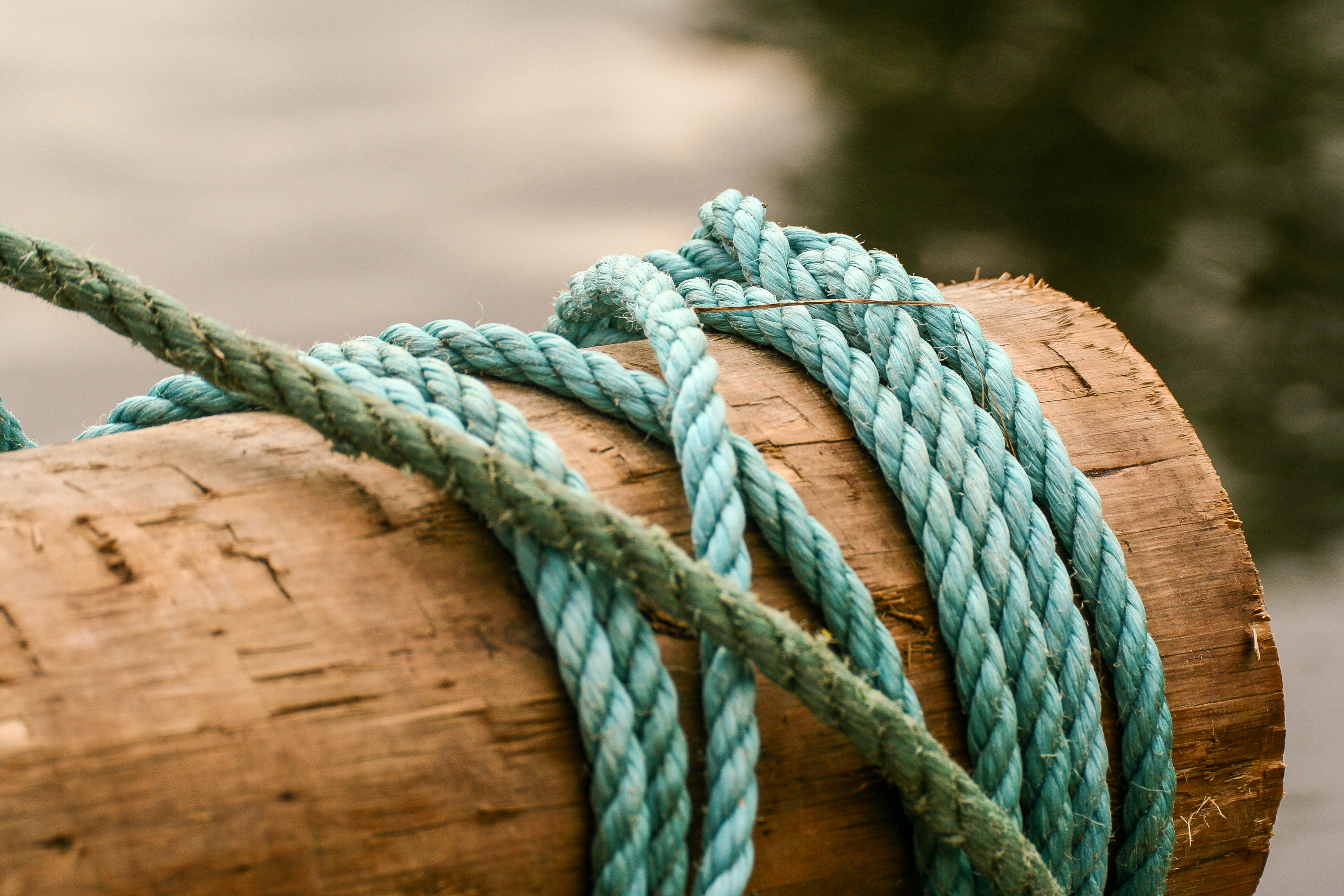
Knot on a wooden beam. | Source: Shutterstock
I understood his concern, but desperation fueled my resolve. "We have no other option. We'll head in the direction the helicopter's sound came from. That's likely where the shore is."
The others were hesitant, their faces etched with fear at the thought of braving the open ocean on a makeshift raft. I sympathized with their fears, but the thought of my son, Peter, waiting for me, not knowing where I was or if I'd ever return, spurred me on. I couldn't just sit and wait for the end on this frozen island. I had to try, for Peter's sake.
From that moment, our focus shifted to one goal: building a raft. The task was daunting, but the thought of seeing my son again spurred me on. Will and I scoured the island's shoreline, searching for materials. We found tree trunks, some large enough to form the base of our raft. They were heavy, and dragging them through the snow and ice to our chosen assembly spot was a test of strength and will.
We used ropes and bits of netting we had salvaged from the wreckage to bind the trunks together. The process was slow and painstaking. Our fingers were numb with cold, and each knot felt like a battle against our own stiff, freezing hands. We worked mostly in silence, each lost in our thoughts, the urgency of our situation driving us.
For the raft's platform, we gathered planks and pieces of wood, anything that floated and could hold weight. These we laid across the bound trunks, creating a makeshift deck. The work was exhausting, but with each piece we added, our hope grew. This raft was more than just a collection of driftwood and debris; it was our lifeline, our chance at getting back to the world.
As the raft began to take shape, we realized we needed a sail. Using pieces of the awning from the lifeboat and some leftover ropes, we constructed a simple sail. It wasn't perfect, but it would catch the wind and hopefully propel us toward rescue.
Standing back and looking at our handiwork, a mix of pride and fear washed over me. The raft was rudimentary, but it floated, and that was all we needed. The thought of launching into the vast, open ocean on this fragile craft was terrifying, yet it was the only chance we had. With thoughts of Peter in my mind, a reminder of what I was fighting for, I steeled myself for the next phase of our journey. We had built our escape; now we had to trust it to carry us home.
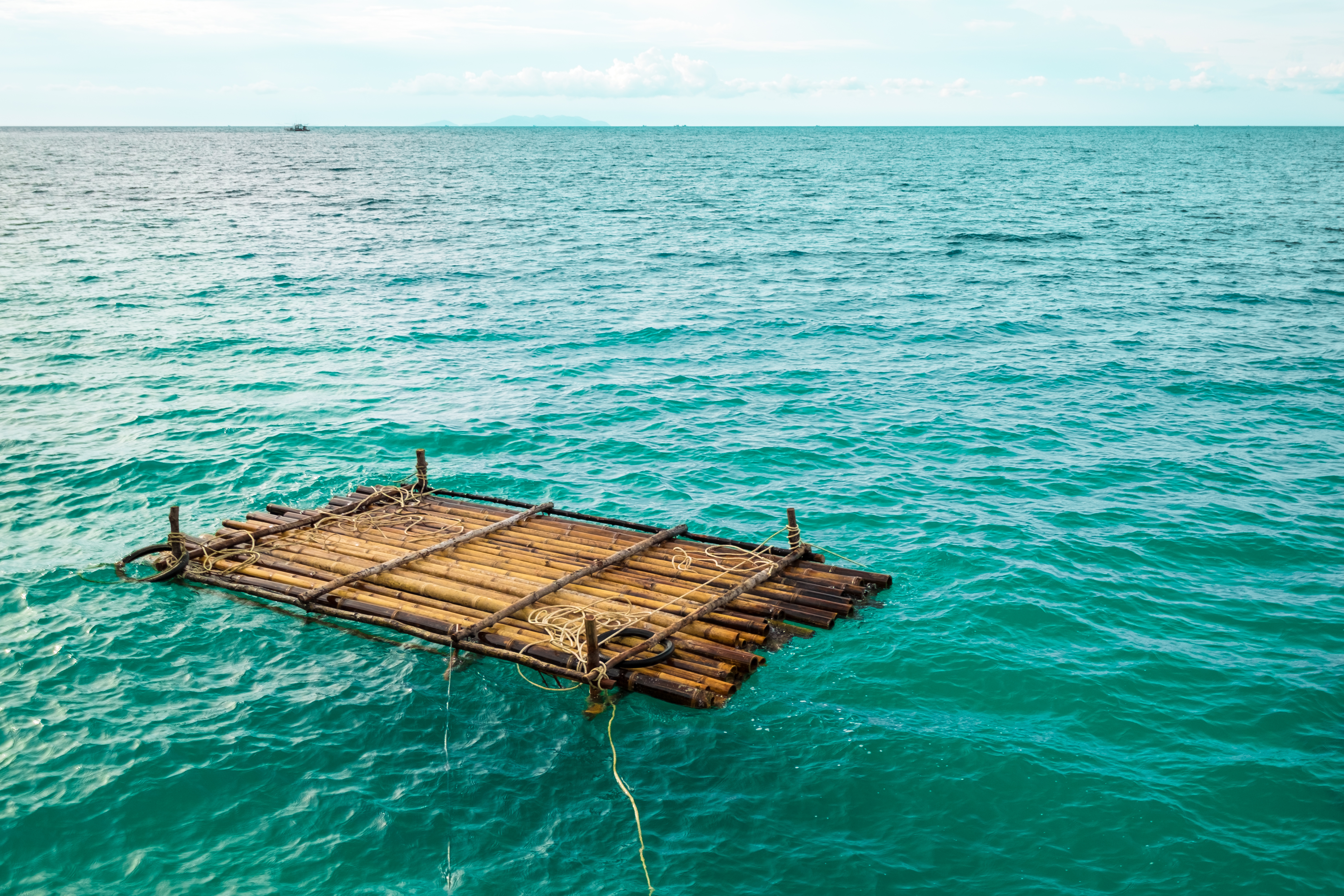
Wooden raft is floating in water. | Source: Shutterstock
The morning we set out on our makeshift raft, the air was filled with a mix of apprehension and determination. Kieran and Mike stood on the shore, their faces a blend of worry and hope, as Will and I prepared to embark on our perilous journey. We bid them farewell, promising to find help and come back for them. With our supplies packed, we pushed the raft into the icy waters and began our odyssey.
However, our spirits dampened just hours into the voyage. Hungry, I reached into our bag for a snack, only to find it empty. The realization hit like a wave: Mike and Kieran had switched the bags, taking the one filled with our food and warm clothes. A cold sense of betrayal washed over me, and the severity of our situation became starkly clear.
With no choice but to continue, Will and I focused on navigation, using the compass we had salvaged. We aimed in the direction where we thought the helicopter had flown, hoping it would lead us to civilization. The ocean was vast and unforgiving, the waves relentless. We rowed tirelessly, but progress was slow and exhausting.
The cold was our constant enemy. By the second day, hunger gnawed at our insides. In a desperate attempt for food, we tried catching seagulls. Miraculously, we managed to catch one and ate it raw, the act driven by sheer survival instinct. It was a grim and gruesome meal, but necessary for our survival.
As the hours stretched on, Will's condition began to deteriorate. He started mumbling incoherently, his thoughts becoming jumbled, a clear sign of delirium setting in. I watched helplessly as his strong, resilient demeanor gave way to confusion and fear.
On the second night, the cold became unbearable. Will was shivering uncontrollably, his body starting to succumb to the freezing temperatures. Acting on instinct, I removed most of my clothes and wrapped them around him, trying to offer whatever warmth I could. My own body began to feel the harsh bite of the cold, but my concern for Will overshadowed my discomfort.
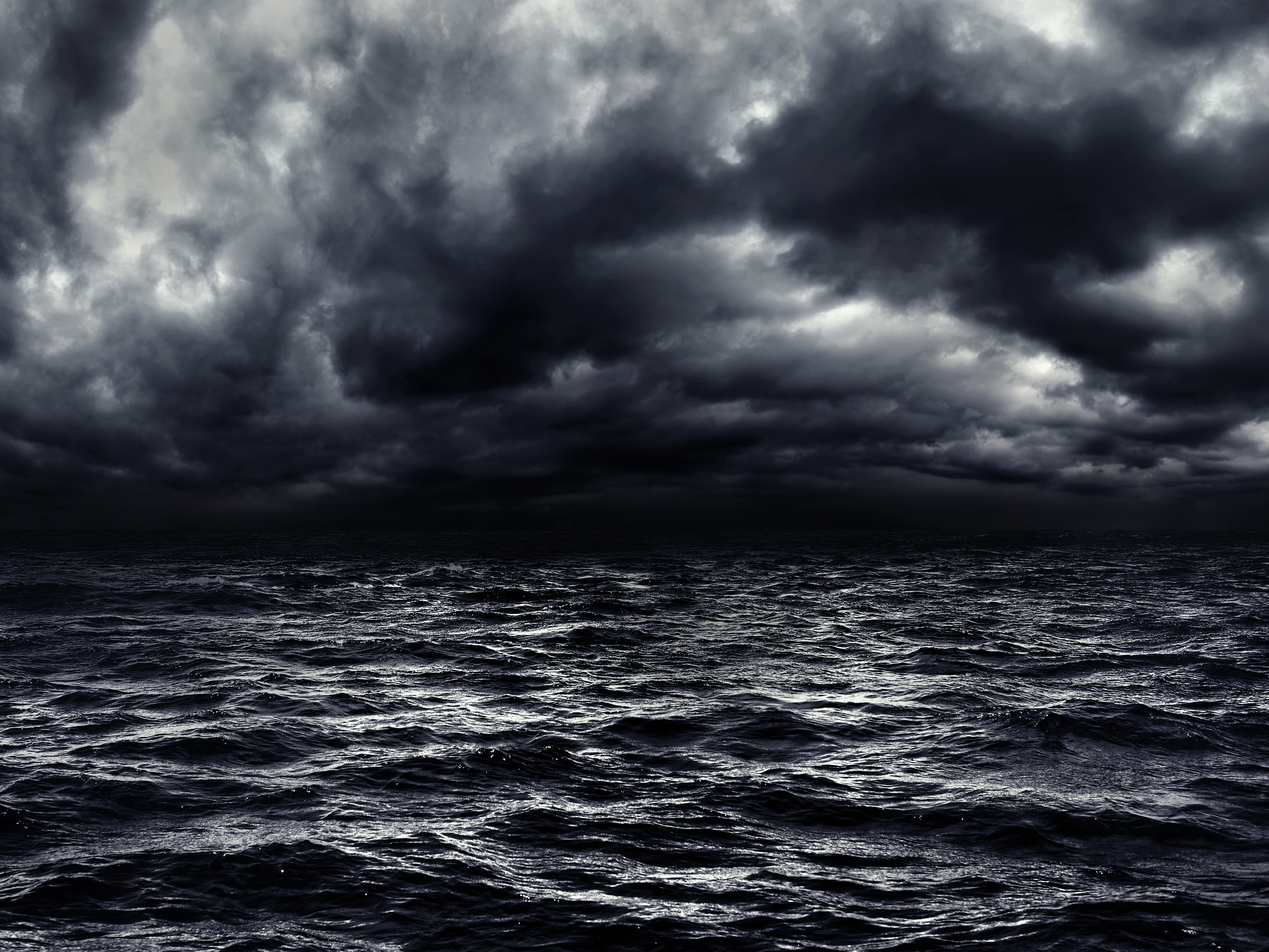
Dark stormy sea with a dramatic cloudy sky. | Source: Shutterstock
Exhausted, cold, and drained, I huddled close to Will, embracing him in an attempt to share body heat. As I held him, my eyelids grew heavy, and despite the perilous situation, sleep overtook me. I drifted off with one prevailing thought - the hope that we would survive and I would see my son Peter again.
Waking up in the hospital was like emerging from a nightmare into another realm of confusion and brightness. My eyes struggled to adjust to the sterile, fluorescent light. Next to me stood a nurse, her face etched with concern. Noticing my awakening, she hurried out of the room, presumably to fetch the doctor.
Soon, the room was bustling with activity. The doctor, accompanied by representatives of the rescue service, entered. They bombarded me with questions, their voices a blend of urgency and relief. I recounted everything as best as I could, my voice hoarse and weak. I emphasized the urgency of rescuing Kieran and Mike, who were still stranded on the island. I described the island's location and features in as much detail as my exhausted mind could muster. They listened intently, taking notes, and assured me they would initiate a rescue operation immediately.
Amidst the whirlwind of questions and medical checks, a thought struck me, chilling me to the bone. "Where's Will?" I managed to ask the nurse, my voice barely above a whisper.
Her expression softened with sympathy as she delivered the news. "The person who washed ashore with you, he... he didn't make it. He died of hypothermia," she said gently.

Hospital beds in hospital room. | Source: Shutterstock
The words hit me like a physical blow. Tears welled up in my eyes, blurring my vision. Will, who had been through so much, who had fought alongside me to survive, had succumbed to the very element we had battled against. Guilt, sorrow, and a profound sense of loss engulfed me. I lay there, overwhelmed by a torrent of emotions, thinking about Will's family, who would now be mourning, just as I had mourned for my wife. In that moment, amidst the safety and sterility of the hospital, the harsh reality of our ordeal on the open sea and the price it had extracted became painfully clear.
Another day passed in the hospital, a blur of white walls and the distant sounds of bustling corridors. It was during one of those quiet, introspective moments that a visitor came to my ward. She was an older woman, her face etched with the lines of time and recent grief. She introduced herself with a voice both strong and tender – she was Will's mother.
As she sat by my bedside, her eyes held a mix of sadness and gratitude. "I'm here to thank you, Thomas," she began, her voice quivering slightly. "Will spoke of you in his letters. He mentioned how you shared your clothes with him on the raft, how you tried to keep him warm."
Her words brought back a flood of memories, the cold, desperate hours on the raft vivid in my mind. I could only nod, words failing me in the face of her loss.
She continued, her hands clasped tightly in her lap. "The insurance company, they've contacted me about Will's death. There's to be compensation," she said, her voice trailing off. Then, with a look of resolute kindness, she added, "I've asked them to transfer all the funds to your account."
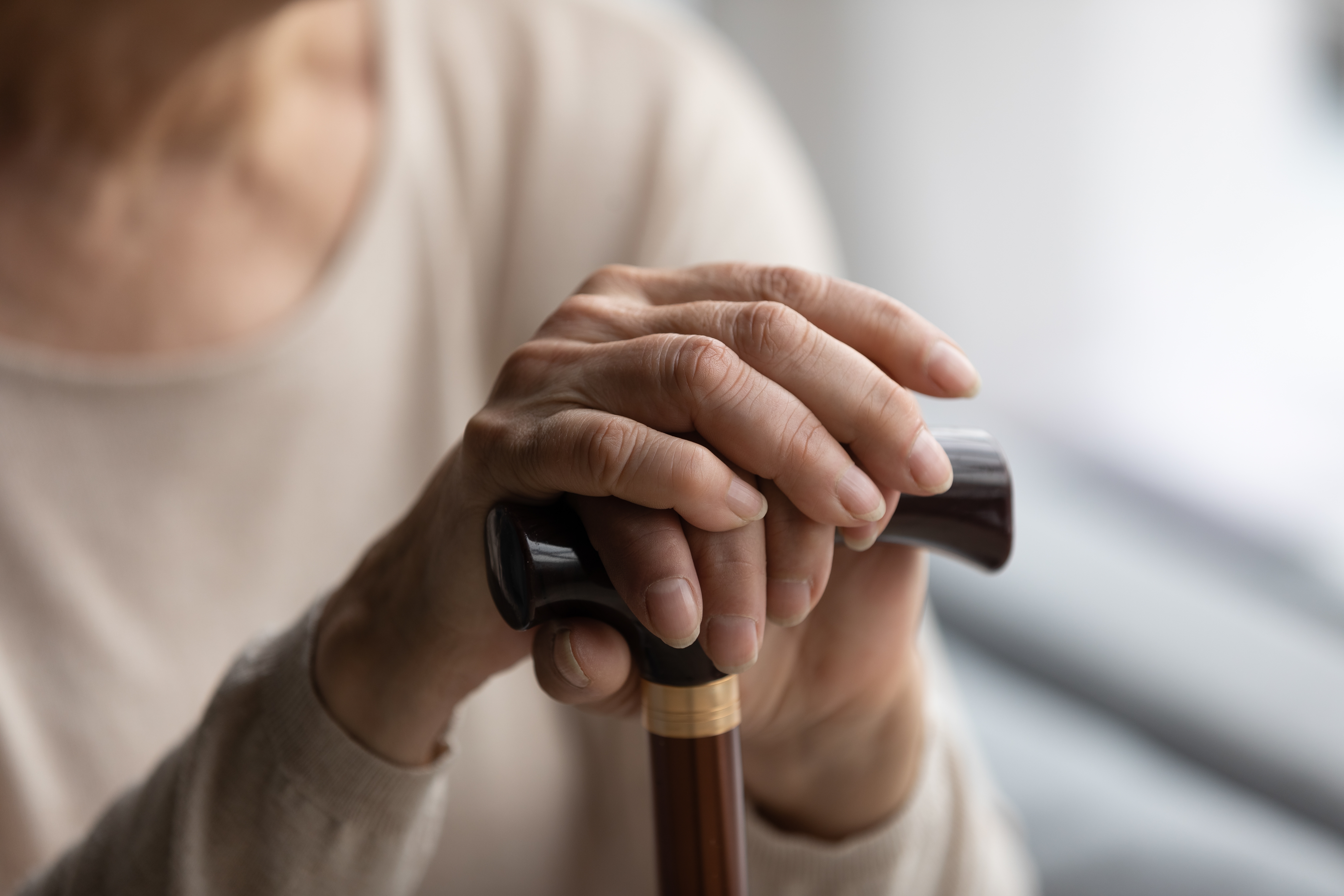
Close up focus on folded wrinkled female hands on wooden cane. | Source: Shutterstock
I was taken aback, unable to fully process her words. "But why? I couldn't save him," I managed to stammer, the guilt and sorrow I felt making my throat tight.
She reached out, placing her hand over mine. "Because you tried, Thomas. You gave my son hope and comfort in his final hours. That means more to me than you can imagine." Her eyes, filled with unshed tears, met mine, conveying a depth of gratitude and sorrow.
The gesture and her words were overwhelming. In that small hospital room, we shared a moment of profound connection – two strangers brought together by Will's passing. Her generosity and kindness in the face of such loss were a testament to the human spirit's capacity for compassion and empathy. I lay there, humbled and moved, feeling an unexpected sense of solace and responsibility. It was a reminder of the goodness in people, even amidst the most tragic of circumstances.
A week after my hospital release, I found myself standing outside the airport in my hometown, a place that now felt both familiar and foreign. The ordeal I had survived seemed like a distant nightmare, yet the memories were etched deep within me. With Will's mother's generous gift, I had the means to reunite with my son, Peter. My heart swelled with anticipation as I hailed a taxi and directed it towards the shelter where Peter was staying.
Upon arriving, I hurried inside, my steps quick with the eagerness of a father longing to see his child. I approached the shelter director's office, my mind filled with images of Peter's smile, his laughter. I could barely contain my excitement as I told the director I was here to pick up my son.
But her next words stopped me cold. "Your son has already been taken," she said, her voice even, revealing nothing of the turmoil her words caused.

Handsome depressed man near window, closeup. | Source: Shutterstock
Confusion and disbelief washed over me. "What? How? Without my knowledge? How is that possible?" I demanded, my voice rising with panic.
She explained calmly, yet the words struck like a hammer. "He was taken by his biological father."
I felt a mix of anger and shock. "That's a mistake! I am Peter's biological father! He is my son!" I exclaimed, the room spinning around me.
The director remained unmoved, her tone firm. "We conducted a DNA test. The man who took him is his biological father."
The revelation felt unreal, like a cruel twist in an already painful journey. Desperate for answers, for a chance to see Peter, I pressed her for the address of where my son now lived. Reluctance crossed her face, but a few hundred dollar bills persuaded her to scribble the address on a piece of paper.
With the address clutched tightly in my hand, I left the shelter in a daze, my mind racing with questions and fears. I called another taxi, giving the driver the address, each mile bringing me closer to the unknown reality of my son's new life.
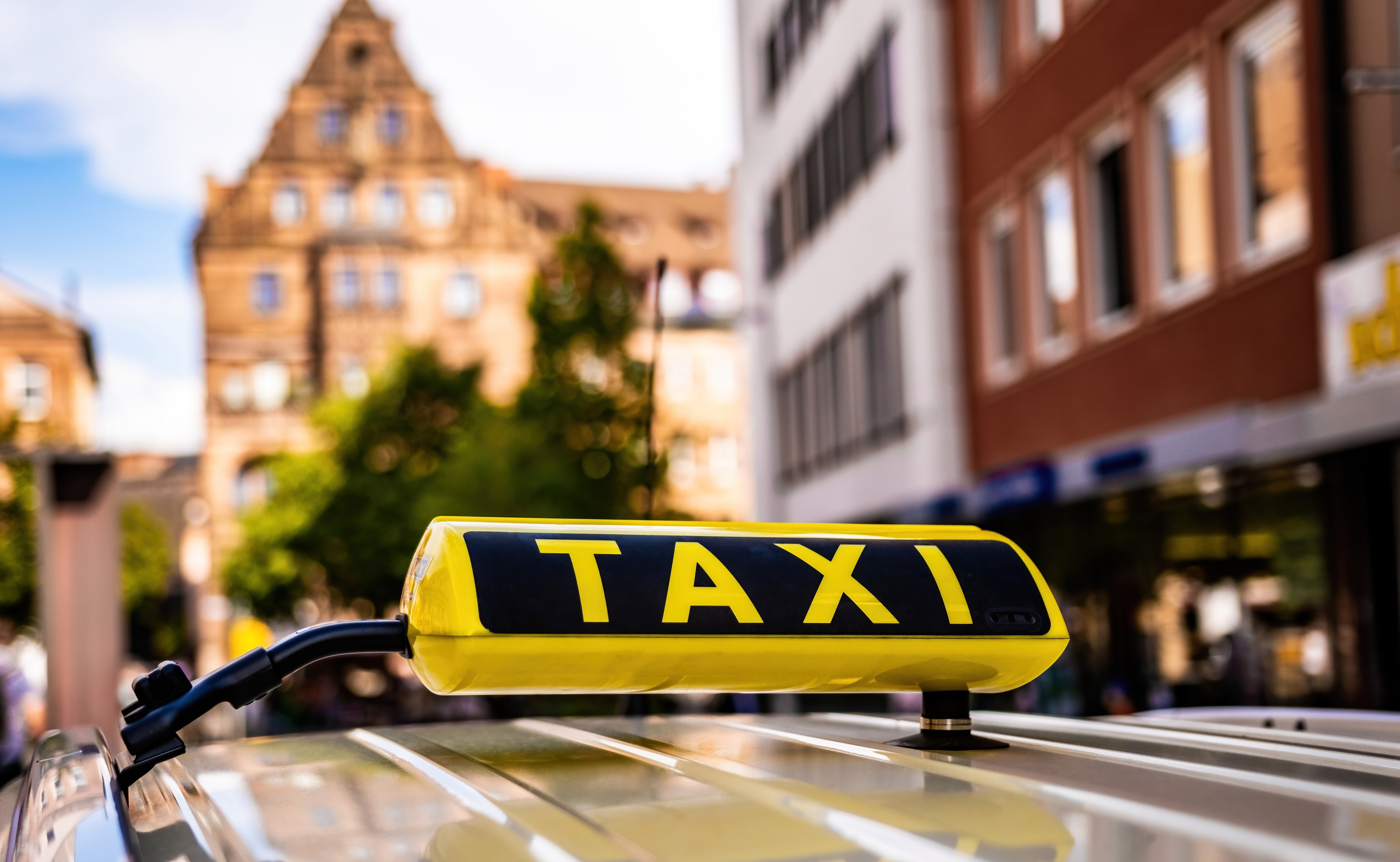
Yellow taxi sign. | Source: Shutterstock
The taxi ride to the estate felt surreal, like a journey through someone else's life. The grandeur of the estate was overwhelming, a stark contrast to the life Peter and I had known. "Does my Peter live here now?" I wondered, feeling out of place amidst such luxury.
Approaching the ornate gate, I rang the bell. A well-dressed butler appeared, listening as I asked for Travis Gray, the man who had taken my son. He led me to a modest hut on the property, explaining that Travis was the estate's watchman.
Knocking on the door, my heart pounded with a mix of anticipation and dread. A man around thirty answered. He looked nothing like I expected; his clothes were simple, his demeanor humble. I introduced myself, stating my purpose. "I'm Peter's father. I've come to take him home."
Travis's expression was a mixture of sadness and resolve. "I understand why you're here, but there's something you need to know. I'm Peter's biological father," he said, his voice steady.
I felt my world spin. "That's impossible. Linda would have told me," I stammered, disbelief clouding my thoughts.
Travis sighed. "Linda and I were together before she was with you. I left her, not knowing she was pregnant. She went back to you, and I had no idea about Peter until I returned to the city."

Man Sharing Life Problems. | Source: Shutterstock
His story unfolded, each word like a weight. He learned of Linda's death and Peter's situation from neighbors. "They said you went to Alaska, and no one thought you'd come back for Peter. So I took him. I had to," he explained, a hint of defensiveness in his tone.
"But why now? Why after all this time?" I asked, struggling to process everything.
Travis's eyes glistened with unshed tears. "Peter... he's sick. He has cancer. I'm scared I'm going to lose him."
The revelation hit me hard. Peter, my little boy, was facing a battle far greater than anything we had endured. The complexities of the situation, the tangled web of past and present, suddenly seemed insignificant against the stark reality of Peter's illness.
I stood there, outside Travis's humble home, my mind racing with emotions. Anger, confusion, but above all, a deep concern for Peter. In that moment, all differences, all grievances paled in comparison to the love I had for my son and the need to be there for him, no matter what.
The moment little Peter emerged from the other room, my heart leaped. "Daddy!" he called out with innocent excitement. Instinctively, I stretched my arms open, expecting him to run into them, a reunion I had imagined countless times. But instead, Peter ran straight to Travis, wrapping his small arms around him. The scene before me was a poignant reminder of the complex tapestry of relationships and love.
Resigned yet determined, I pulled out my checkbook. My hands were steady as I wrote a check for $150,000, the amount I hoped would cover Peter's medical expenses. Handing the check to Travis, I tried to keep my voice even. "This is for you. I think this will be enough for the operation," I said, my voice laced with a mix of sadness and resolve.

Business man prepare writing a check. | Source: Shutterstock
Travis looked at me, perplexed. "Why are you helping us?" he asked, his eyes searching mine for an answer.
I looked at Peter, his small frame a symbol of innocence and love, then back at Travis. "Because my love for Peter drove me to survive in conditions where survival seemed impossible. My love for him changed me, changed my entire perspective on life. I owe it to Peter, even if he's not my son," I explained, my voice thick with emotion. "And he's not to blame for the choices his mother made," I added, acknowledging the complicated history that brought us all here.
With those words, I turned and walked away, my heart heavy yet hopeful. Tears blurred my vision, but I wiped them away, knowing that I had done the right thing. In the end, it was love for Peter that guided my actions, a love that transcended blood and circumstance, a love that endured despite the unexpected turns of life.
The next day, I stood outside the hotel, my bag packed, ready to return to Alaska. The company had offered me a job in their office, a chance to start anew, a way to rebuild my life after the turmoil of recent events. As I approached the cab, ready to leave behind the city and the tangled web of emotions it held, I heard a familiar voice call out from behind.
"Wait!" It was Travis, his voice tinged with urgency. I turned around, surprised to see him there. Beside him stood little Peter, his small hand gripping Travis's.
"Can we go with you?" Travis asked, a hopeful yet uncertain look in his eyes.
For a moment, I was taken aback. The request was unexpected, yet something in his voice and the earnest look on Peter's face gave me pause. I considered their situation – the struggle they were facing, the challenges that lay ahead. A part of me knew that this could be a new beginning for all of us.
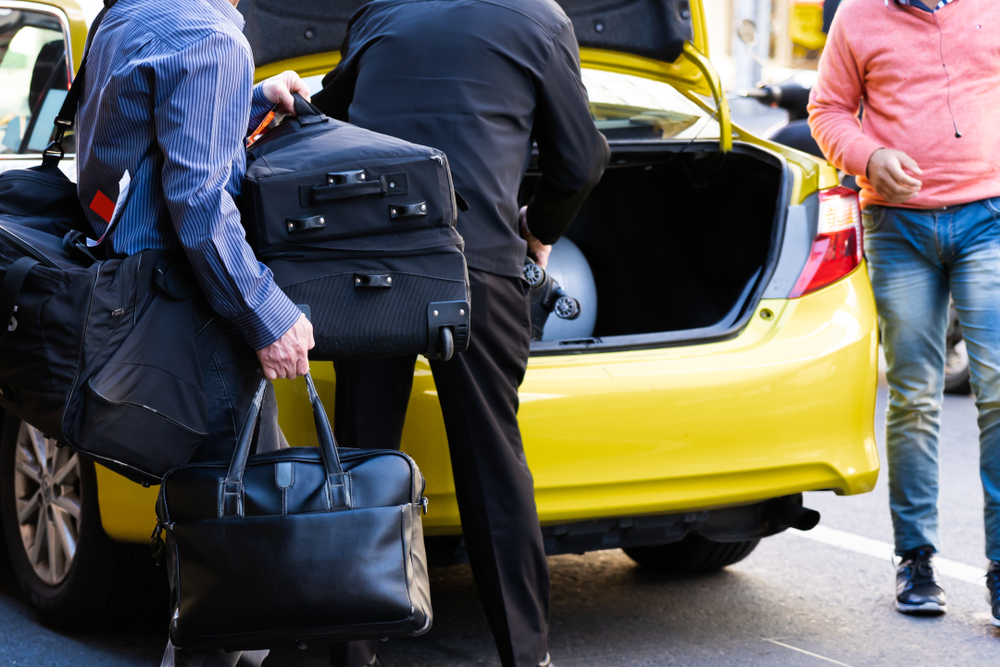
Passengers loading their luggages in the trunk of taxi. | Source: Shutterstock
I looked at Peter, his eyes wide with a mix of curiosity and hope. In that moment, I realized the profound connection I still felt for him. He was a part of my life, a part that I couldn't just leave behind, no matter the circumstances.
"Of course, you can come," I found myself saying, the words filled with a newfound sense of purpose and determination. "Let's start a new chapter together."
Travis's face broke into a relieved smile, and Peter's grin mirrored his. As we got into the cab, a sense of family, unconventional yet real, enveloped us. The ride to the airport was filled with talk of the future, of the possibilities that lay in Alaska. It was a fresh start, not just for me, but for all of us. As the city faded into the distance, I felt a sense of hope, a belief that together, we could face whatever lay ahead.
Tell us what you think about this story, and share it with your friends. It might inspire them and brighten their day.
If you enjoyed this story, here's another one: I was trapped in a marriage to a cruel and controlling criminal. I had started to lose hope of escaping from him without ending up buried beside his two previous wives when one dinner changed everything. Read the full story here.
This piece is inspired by stories from the everyday lives of our readers and written by a professional writer. Any resemblance to actual names or locations is purely coincidental. All images are for illustration purposes only. Share your story with us; maybe it will change someone's life. If you would like to share your story, please send it to info@amomama.com
